Download
News 2013/3
Brian Wilson
The 2013/2 Download News is here
and earlier editions are indexed here.
Recording
of the Month
James WHITBOURN (b. 1963)
Annelies (Chamber Version, 2009: World Première
Recording)
Arianna Zukerman (soprano)
Westminster Williamson Voices
The Lincoln Trio (Desirée Ruhstrat (violin), David Cunliffe
(cello), Marta Aznavoorian (piano)) with Bharat Chandra (clarinet)/James
Jordan
rec. Princeton Meadow Church, New Jersey, USA, 14-16 May 2012.
DDD.
Pdf booklet with texts included.
NAXOS 8.573070 [69:53] – from classicsonline.com
(mp3 and lossless) or stream from Naxos Music Library
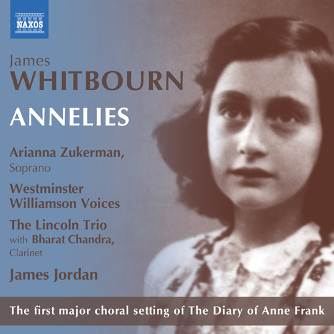 Naxos
and classicsonline.com are, rightly, making much of this recording.
This is timeless music, setting extracts from the diaries of
Anne Frank. Not only does it impress as much as earlier releases
of James Whitbourn’s music have impressed John Quinn (Naxos:
review)
and Grace Lace (Etcetera – review:
Recording of the Month); for me it joins Britten’s
War Requiem and Tippett’s A Child of our Time
as a major work bewailing the inhumanity of twentieth-century
man to man, though it’s very different in tone from either of
them. The music is uplifting, yet never in such a way as to
draw attention to itself from the words of Anne Frank – with
one brief exception, describing the fate of the family, everything
here comes from her.
Naxos
and classicsonline.com are, rightly, making much of this recording.
This is timeless music, setting extracts from the diaries of
Anne Frank. Not only does it impress as much as earlier releases
of James Whitbourn’s music have impressed John Quinn (Naxos:
review)
and Grace Lace (Etcetera – review:
Recording of the Month); for me it joins Britten’s
War Requiem and Tippett’s A Child of our Time
as a major work bewailing the inhumanity of twentieth-century
man to man, though it’s very different in tone from either of
them. The music is uplifting, yet never in such a way as to
draw attention to itself from the words of Anne Frank – with
one brief exception, describing the fate of the family, everything
here comes from her.
Performances are exemplary. There’s an excellent booklet and
the recording is very good indeed. Classicsonline.com kindly
supplied me with both mp3 and lossless (16/44.1 flac) versions
and I’d certainly recommend paying a little more for the latter
(£5.99 against £4.99) though I’m still puzzled by
the logic of providing the flac as a single file when most download
sites offer both mp3 and lossless as separate tracks.
Bargains
of the Month
Renaissance Radio
Celebrating the 40th Anniversary of The Tallis Scholars: Sacred
Music from the Renaissance Era for Celestial and Secular Radio
Gregorio ALLEGRI Miserere
(omitting vv.7-18) – rec. 2007 [5:50]
Josquin DESPREZ Ave Maria
... virgo serena – rec. 1986 [5:27]
Cipriano de RORE Descendi
in hortum meum – rec. 1994 [5:24]
Jacobus CLEMENS non Papa Ego
flos campi – rec. 1987 [4:11]
Jean MOUTON Salva nos
Domine – rec. 2012 [2:31]
Orlande de LASSUS Ave
Regina cœlorum – rec. 1989 [3:53]; Salve Regina
– rec. 1989 [3:58]
Hieronymus PRÆTORIUS
Joseph lieber, Joseph mein – rec. 1989 [2:33]
Josquin DESPREZ Agnus
Dei III (Missa L’homme armé sexti toni)
– rec. 1989 [4:16]
Antoine BRUMEL Agnus
Dei II (Missa Et ecce terræ motus) – rec. 1992
[3:29]
Giovanni Pierluigi da PALESTRINA Agnus
Dei II (Missa Brevis) – rec. 1986 [3:07]; sicut
lilium inter spineas – rec. 1989 [4:45]
Carlo GESUALDO Precibus
et meritis – rec.1987 [3:03]; Maria, mater gratiae
– rec. 1987 [3:43]
Francisco GUERRERO Ave
virgo sanctissima – rec. 2006 [3:59]
Tomas Luis de VICTORIA Ave
Maria [4 vv] – rec. 1986 [2:17]; O vos omnes (Tenebrae
Responsories) – rec. 1990 [2:53]; Kyrie (Requiem)
[6 vv] – rec. 1987 [2:36]; Graduale (Requiem)
[6 vv] – rec. 1987 [3:11; Versa est in luctum – rec.
1992 [3:51]
Thomas TALLIS Incipit
(Lamentations I) [1:22]; Aleph (Lamentations I) [2:39];
Beth (Lamentations I) – rec. 1992 [4:49]; Mihi autem
nimis – rec. 1992 [2:37]; O sacrum convivium – rec.
1992[3:40]; O nata lux – rec. 1992 [2:03]; Miserere
nostri – rec. 1985 [2:32]
John TAVERNER Leroy Kyrie
– rec. 2013 [3:33]; Benedictus (Missa Gloria tibi
Trinitas)– rec. 2013 [2:59]
William CORNYSH Ave Maria
– rec. 1988 [3:11]
Robert WHITE Christe
qui lux es III – rec. 1995 [4:55]
John SHEPPARD In manus
tuas I [3:29]; In manus tuas II [2:56]; In manus
tuas III – rec. 1989 [2:55]
William BYRD Agnus Dei
(Mass for four voices) – rec. 1984 [3:18]
Thomas TALLIS If ye love
me – rec. 1986 [2:04]; Hear the voice and prayer – rec. 1986
[3:06]; A new commandment – rec. 1986 [2:42]; Why fum’th
in fight – rec. 1986 [0:58]; Even like the hunted hind – rec.
1986 [0:53]; God grant we grace – rec. 1986 [1:04]; Come Holy
Ghost – rec. 1986 [0:41]
Thomas TOMKINS When David
heard – rec. 1991 [4:27]
William BYRD Sing joyfully
– rec. 1987 [2:48]; O God, the proud are risen – rec. 1987 [3:04];
O Lord, make thy servant Elizabeth – rec. 1987 [2:52]; Nunc
dimittis (The Great Service) – rec. 1987 [5:21]
The Tallis Scholars/Peter Phillips – rec. dates as above.
Pdf booklet with texts and translations included.
GIMELL CDGIM212 [2 CDs: 151:46] – from gimell.com
(mp3 and lossless)
 This
is the latest budget-price distillation of the recordings made
by The Tallis Scholars and it joins a long list of strong recommendations
included in a special Download Roundup dedicated to their recordings
– here
– and subsequent recommendations of three 3-CD distillations
of their recordings (GIMBX301, 302 and 303)
plus their most recent recording of Mouton’s Missa dictes
moy toutes voz pensées (GIMCD047 – see review
and Download
News 2012/19). Encouraged by the (P) 2013 affixed to the
two Taverner pieces, I understand that we are about to have
a new recording from the Tallis Scholars of the music of this
composer; though they made a classic recording of his Missa
Gloria tibi Trinitas and the Leroy Kyrie in 1984
(CDGIM004) the Western Wind Mass from that CD has been
reissued on inexpensive twofers, making the single disc effectively
half-redundant, so a new coupling including the Missa Gloria
tibi Trinitas would make sense.
This
is the latest budget-price distillation of the recordings made
by The Tallis Scholars and it joins a long list of strong recommendations
included in a special Download Roundup dedicated to their recordings
– here
– and subsequent recommendations of three 3-CD distillations
of their recordings (GIMBX301, 302 and 303)
plus their most recent recording of Mouton’s Missa dictes
moy toutes voz pensées (GIMCD047 – see review
and Download
News 2012/19). Encouraged by the (P) 2013 affixed to the
two Taverner pieces, I understand that we are about to have
a new recording from the Tallis Scholars of the music of this
composer; though they made a classic recording of his Missa
Gloria tibi Trinitas and the Leroy Kyrie in 1984
(CDGIM004) the Western Wind Mass from that CD has been
reissued on inexpensive twofers, making the single disc effectively
half-redundant, so a new coupling including the Missa Gloria
tibi Trinitas would make sense.
There has always been healthy artistic rivalry between The Tallis
Scholars and The Sixteen in this repertoire, nowhere more so
than in the Allegri Miserere which opens this new Gimell
set – something of a signature tune for both groups, but especially
so for The Tallis Scholars, who first grabbed our attention
with a recording of that work licensed to Classics for Pleasure
which featured as runner-up for the 1980 Gramophone Awards.
The version included here is their 2007 remake; I’m not even
going to try to compare it with the earlier recording or with
The Sixteen; you really need to have all three.
There’s plenty of Tallis and Byrd here, which is more than fitting;
I’m glad that room has been found for some of their settings
of English texts, too. In the case of the music from Archbishop
Parker’s collection the words may be corny – it was not until
the 1662 Prayer Book that the Anglican Church had a decent translation
of Come Holy Ghost to set – but Tallis’s music more than
makes amends, while Byrd did the nascent English church proud
with his Great Service – almost the equal of his three settings
of the Latin rite.
Though I know all these recordings well – many of them are regular
visitors to my audio system in various formats – I downloaded
the programme to hear the music in context. I’ve used all
my superlatives long ago on Tallis Scholars recordings, so I’ll
simply urge you to make the modest investment required to obtain
the new set, even if you already have some or most of the original
releases. The danger of such a collection is that it may sound
bitty but that’s far from the case here. Nor is it all samey:
two works in particular stand out as different from renaissance
polyphony, Prætorius’s Christmas motet and Tomkins’
When David heard, the latest composition here, from the
second generation of Anglican composers who were able to build
on the work of Tallis and Byrd and even excel them.
At £7.99 (mp3), £8.99 (lossless) or £12.75
(2-disc set) it won’t break the bank, but I warn you that it
will tempt you to splash out on those originals which you don’t
yet have. The time span of the parent recordings means that
there is no 24-bit equivalent, but you won’t be disappointed
with the quality of the sound; I tried both the wma and mp3
versions and even the latter sounds fine. As well as the pdf
booklet with texts and translations, if you play the recordings
via Windows Media Player the texts and the brief notes appear
on screen too; there’s no need for a bargain recording to seem
cheap and this certainly doesn’t.
Now you need to turn to those Gimell 3-CD sets which I’ve
mentioned and to Hyperion’s equally mandatory collection of
recordings from this period by The Sixteen: The Golden Age of
English Polyphony (CDS44401/10
– review
and review:
Bargain of the Month). And if you wish to hear
that first recording of the Allegri Miserere, Mundy’s Vox
patris cœlestis and Palestrina’s Missa papæ
Marcelli, it’s available at an attractive price on GIMSE401.
 Lovers
of English polyphonic music should also note the reissue of
Thomas TALLIS Missa Salve
intemerata, the sections of which are interspersed with
other Marian motets, as performed in 2000 by Winchester Cathedral
Choir directed by David Hill on Hyperion’s budget Helios label,
with pdf booklet of texts and translations: CDH55400
[67:48] – from hyperion-records.co.uk
(mp3 and lossless). You’ll find Gary Higginson’s review
of the ‘very fine’ original release here.
It’s even finer at the new lower price and it neatly complements
the Tallis on the new Gimell CDs – but don’t forget the complete
works of Tallis which Alistair Dixon and Chapelle du Roi recorded
for Signum, available separately on CD and download, as a 10-disc
boxed set at budget price: Brilliant Classics 94268),
and in a 2-CD distillation on the budget Regis label (RRC2090).
Lovers
of English polyphonic music should also note the reissue of
Thomas TALLIS Missa Salve
intemerata, the sections of which are interspersed with
other Marian motets, as performed in 2000 by Winchester Cathedral
Choir directed by David Hill on Hyperion’s budget Helios label,
with pdf booklet of texts and translations: CDH55400
[67:48] – from hyperion-records.co.uk
(mp3 and lossless). You’ll find Gary Higginson’s review
of the ‘very fine’ original release here.
It’s even finer at the new lower price and it neatly complements
the Tallis on the new Gimell CDs – but don’t forget the complete
works of Tallis which Alistair Dixon and Chapelle du Roi recorded
for Signum, available separately on CD and download, as a 10-disc
boxed set at budget price: Brilliant Classics 94268),
and in a 2-CD distillation on the budget Regis label (RRC2090).
George Frideric HANDEL (1685-1759)
arr. Sir Thomas BEECHAM
Love in Bath (ballet suite, 1945)
Ilse Hollweg (soprano)
Royal Philharmonic Orchestra/Sir Thomas Beecham – rec. 1956-59
DISCOVER CLASSICAL [45:46] – from emusic.com
(mp3)
 This
wonderful concoction, mainly from four Handel operas, comes
complete on one track for £0.42 or less from emusic.com.
The bit-rate is not great (156 kb/s) and the recording is rather
thin and not comparable with my CD of an earlier EMI reissue
on the Studio label, but bearable, especially if you intend
to listen via your mp3 player. Otherwise, turn to the EMI Gemini
2-CD set where the coupling is Solomon (5865162, around
£7.50 on CD; download for £5.99 from sainsburysentertainment.co.uk).
Classicsonline.com
offer an alternative – and probably preferable – transfer for
£1.99 (Naxos 9.80915: not available in the USA
and several other countries). The slightly shorter playing time
of the Discover Classical transfer suggests that it has been
made from a turntable running slightly fast; the Naxos version
runs for 46:44, like the EMI CD.
This
wonderful concoction, mainly from four Handel operas, comes
complete on one track for £0.42 or less from emusic.com.
The bit-rate is not great (156 kb/s) and the recording is rather
thin and not comparable with my CD of an earlier EMI reissue
on the Studio label, but bearable, especially if you intend
to listen via your mp3 player. Otherwise, turn to the EMI Gemini
2-CD set where the coupling is Solomon (5865162, around
£7.50 on CD; download for £5.99 from sainsburysentertainment.co.uk).
Classicsonline.com
offer an alternative – and probably preferable – transfer for
£1.99 (Naxos 9.80915: not available in the USA
and several other countries). The slightly shorter playing time
of the Discover Classical transfer suggests that it has been
made from a turntable running slightly fast; the Naxos version
runs for 46:44, like the EMI CD.
Love in Bath originated as ballet music for The Great
Elopement and Beecham also recorded a suite from this twice
on 78s – the earlier version is on Somm and Discover Classical
also have a recording of the later version from the 1940s, but
the RPO complete version is better recorded and, of course,
more complete.
***
Roland de LASSUS
(Orlando LASSO) (c.1531-1594)
Biographie musicale Volume 1: Années de jeunesse
Hor qui son lasso [2:12]
Poi che’l camin [2:24]
En espoir vis [1:20]
Las, voulez vous qu’une personne chante [1:56]
Quando’l voler [3:08]
Del freddo Rheno [8:09]
Audi dulcis amica [3:53]
Inclina Domine [3:29]
O occhi manza mia [2:43]
Quel chiaro sol [3:10]
Vostro fui [1:36]
Non ha tente serene [9:34]
Fremuit spiritus Jesu [5:11]
Heu mihi Domine [3:12]
Peccavi quid faciam tibi [4:13]
Ludus Modalis (Nathalie Marec, Annie Dufresne (superius), Jean-Christophe
Clair (alto), Hugues Primard (tenor), François Fauché
(bass)/Bruno Boterf (tenor))
MUSIQUE EN WALLONIE MEW1158 [56:13] – from emusic.com
or amazon.co.uk
(both mp3)
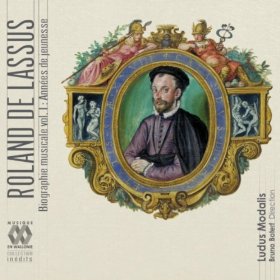 All
the music here dates from early in Lassus’s artistic life, so
there are none of the major works and nothing here is duplicated
on any other Lassus CD or download that I have. That makes the
album even more desirable for those who already have some recordings
of Lassus; though early and little known, the music, a mixture
of sacred and secular, is of high quality and the performances
do it full justice.
All
the music here dates from early in Lassus’s artistic life, so
there are none of the major works and nothing here is duplicated
on any other Lassus CD or download that I have. That makes the
album even more desirable for those who already have some recordings
of Lassus; though early and little known, the music, a mixture
of sacred and secular, is of high quality and the performances
do it full justice.
To download this from emusic.com will cost you £6.30 or
less, around half the price of the CD – slightly more, at £7.49,
from amazon.co.uk – but in each case you will miss out on the
hardback booklet in which the disc comes. The emusic.com download
comes at a variable bit-rate, around 230kb/s, so in theory amazon.com’s
nominal 256kb/s is slightly better, but I can’t guarantee that
it will sound any better, as Amazon’s nominal 256 has been known
to fall well short. In fact, the emusic.com sounds perfectly
adequate.
I’ve also received the CD of Volume 2 for review, it’s
housed in a luxury hardback booklet. Subtitled La gloire
musicale de Bavarie (I) – Le temps de la faveur, it covers
his earliest years at the court of Duke Albrecht of Bavaria
and the music is performed this time by Singer Pur (MEW1268
[57:14]). Look out for a review on the main pages of MusicWeb
International and, probably, a brief note in a future Download
News.
Il tormento e l’estasi
Anonymous (attrib. Luigi ROSSI
(1597ca.-1653)?) Un peccator pentito, cantata à
5 [27:38]
Domenico MAZZOCCHI (1592-1665)
Pentito si rivolge a Dio, aria à 3 [3:23]
Biagio MARINI (1594-1663)
Passacaglio [4:45]
Giacomo CARISSIMI (1605-1674)
Jephte, oratorio à 6 [28:14]
Los Musicos De Su Alteza (Olalla Aleman, Eugenia Enguita, Pilar
Moral, Agnieszka Grzywacz, Cristina Bayon (soprano), Marta Infante
(mezzo), Gabriel Diaz (haute-contre), Montserrat Bertral (contralto),
Jose Pizarro, Inigo Casali (tenor), Joao Fernandes, Jesus Garcia
Arejula (bass), Pablo Prieto, Eduardo Fenoll (violin), Natan
Paruzel (viola), Pedro Reula (cello), Ventura Rico (violone),
Rodney Prada (lyre), Chiara Granata (harpe), Josep Maria Marti
(chitarrone), Alfonso Sebastian (organ)/Luis Antonio Gonzalez
(harpsichord) – rec. September 2010. DDD.
Pdf booklet with texts and translations included.
ALPHA 183 [64:08] – from classicsonline.com
(mp3) or stream from Naxos Music Library
[‘a compelling disc’– see review
by Johan van Veen.]
 Of
the works included here, only Carissimi’s Jephte is at
all well known, with several good recordings to its credit;
if anything, that slightly diminishes its value to the seasoned
collector, who may well already own a recording, such as the
Channel Classics album Love and Lament (CCSSA17002)
which I recommended in the August 2010 Roundup.
That recording is now best downloaded from channelclassics.com
in mp3, 16– or 24-bit lossless rather than the low-bit emusic.com
version listed there. Some UK dealers have Love and Lament
as a CD, without the SACD layer, on Channel Canal Grande
CG6012 at mid price.
Of
the works included here, only Carissimi’s Jephte is at
all well known, with several good recordings to its credit;
if anything, that slightly diminishes its value to the seasoned
collector, who may well already own a recording, such as the
Channel Classics album Love and Lament (CCSSA17002)
which I recommended in the August 2010 Roundup.
That recording is now best downloaded from channelclassics.com
in mp3, 16– or 24-bit lossless rather than the low-bit emusic.com
version listed there. Some UK dealers have Love and Lament
as a CD, without the SACD layer, on Channel Canal Grande
CG6012 at mid price.
The title, Torment and Ecstasy, and the cover shot from
a painting of a topless Mary Magdalene may suggest over-the-top
interpretations and there is, indeed, power enough here, but
not excessively so. The mp3 sound is good and it’s good to have
the booklet – it should be the case that downloaders could expect
everything that comes with the CD, but that isn’t always the
case. Better still, the download costs only £4.99.
This seems to be the only recording of the work attributed to
Rossi; for another fine recording of his music turn to Le
Canterine Romane, available in two formats from Warner Classics,
the less expensive of which, on the Apex label, was reviewed
by Johan van Veen here.
Crystal Tears (Dowland and his Contemporaries)
John DOWLAND (1563-1626) Book
of Songs, Book 1: Go, crystal tears [6:29]
John WARD (1589-1638) Fantasia
No. 4 [3:30]
John DOWLAND Now, O now
I needs must part, P.23 [4:32]
Book of Songs, Book 4, ‘A Pilgrimes Solace’: Go nightly
cares, the enemy to rest [4:02]
John WARD Fantasia No. 3
[2:55]
John DOWLAND Sorrow, come!
[3:59]
Semper Dowland semper dolens, P.9 [3:31]
Dowland’s Bells, P.43a, ‘The Lady Rich’s Galliard’
[2:03]
Robert JOHNSON (c1583-1624)
Have you seen the bright lily grow? [2:51]
William BYRD (1543-1623) Though
Amaryllis dance in green [3:43]
John BENET Venus’ birds
whose mournful tunes [3:35]
Robert JOHNSON Full fathom
five [2:10]
John DOWLAND Care-charming
sleep [3:38]
Patrick MANDO Like as the
day [4:03]
John DOWLAND A Fancy [3:29]
Book of Songs, Book 3: Time stands still [4:39]
Alfonso FERRABOSCO II (1572?-1628)
4-note pavan [4:49]
Book of Songs, Book 4, ‘A Pilgrimes Solace’: From
silent night, true register of moans [4:06]
ANONYMOUS O Death Rock Me Asleep [2:57]
Richard MICO (1590-1661) Fantasia
No. 13 [3:18]
Book of Songs, Book 1: Come, heavy sleep [5:02]
Andreas Scholl (counter-tenor)
Concerto di Viole (Brian Franklin, Rebeka Rusó, Brigitte
Gasser, Arno Jochem)/Julian Behr (lute)) – rec. 2007. DDD.
HARMONIA MUNDI HMC901993 (31009936) [79:21] –
from eclassical.com
(mp3, 16– and 24-bit lossless)
[see review
by Melanie Eskenazi of this programme given in concert at the
Wigmore Hall.]
 First
a warm welcome to the availability of Harmonia Mundi recordings
in lossless sound from eclassical.com in addition to the mp3
versions from classicsonline.com and hmvdigital.com; good as
these are (at 320kb/s) it’s not just audiophiles who will welcome
the lossless flac versions, with 16-bit at the same price as
mp3 and 24-bit for a little extra.
First
a warm welcome to the availability of Harmonia Mundi recordings
in lossless sound from eclassical.com in addition to the mp3
versions from classicsonline.com and hmvdigital.com; good as
these are (at 320kb/s) it’s not just audiophiles who will welcome
the lossless flac versions, with 16-bit at the same price as
mp3 and 24-bit for a little extra.
There’s a complete recording of John Ward’s Fantasias (Linn
CKD339 see October 2009 Download Roundup)
but, as I wrote then, a little goes a long way and most of us
will prefer to have them interspersed with other music, as here
on Harmonia Mundi. In fact I referred to this recording of Crystal
Tears in that Ward review and, with small reservations,
I’m pleased to repeat my recommendation now that it’s available
in lossless sound (24-bit, too, if you’re prepared to pay
a little more) from eclassical.com.
Those reservations? Well though Andreas Scholl sings, I can’t
entirely defend his performances here from the charge of over-stylisation
that I’ve seen levelled against them and his diction is
variable; mostly clear but not always – that’s a special problem
in view of the lack of a booklet. (You won’t get one from classicsonline.com,
either.) The recording sounds a trifle thin in mp3; it’s much
firmer in the 24-bit version (24/44.1, despite having been recorded
at 96kHz) but still not ideal.
This is well worth having, then, but you should also investigate
the long list of recordings of Dowland and his contemporaries
that I reviewed in the September 2012/1 Roundup
– some of those, too, are best downloaded from eclassical.com.
Georg Philipp TELEMANN (1681-1767)
Ouvertures pittoresques
Ouverture in D for three oboes, strings and basso continuo,
TWV55:D15 [22:47]
Ouverture in B flat for strings and basso continuo, TWV55:B5
(‘Völker-Ouvertüre’) [21:59]
Concerto polonois in B flat for strings and basso continuo,
TWV43:B3 [8:52]
Concerto polonois in G for strings and basso continuo, TWV43:G7
[8:14]
Ouverture, jointes d’une Suite tragi-comique in D for three
trumpets, timpani, strings and basso continuo, TWV55:D22 [14:08]
Arte dei Suonatori/Martin Gester – rec. October 2012. DSD.
Pdf booklet included
BIS-SACD-1979 [77:12] – from eclassical.com
(mp3, 16– and 24-bit lossless) or stream from Naxos Music Library
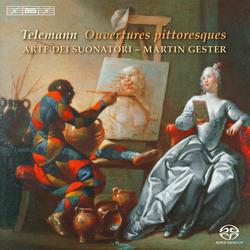 This
seems to have become something of a Telemann-fest; there
are far worse things, but I had actually completed the other
reviews below when this new BIS recording came on the scene.
I’ve praised the work of Arte dei Suonatori before and
this new recording is equally fine.
This
seems to have become something of a Telemann-fest; there
are far worse things, but I had actually completed the other
reviews below when this new BIS recording came on the scene.
I’ve praised the work of Arte dei Suonatori before and
this new recording is equally fine.
There’s a rival version of the Völker Overture among
the fine Telemann recordings which Simon Standage and Collegium
Musicum 90 made for Chandos; choice of coupling would be a safe
guide in deciding between them. The Chandos is a shade more
sprightly and more self-confident and marginally preferable.
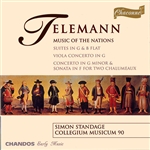 The
Chandos includes the Suite in G ‘des Nations anciens
et modernes’, TWV55:G4, Concerto, TWV52:d1, and Sonata
in F for two chalumeaux, Viola Concerto in G TWV51:G9 and the
Suite in B-flat, TWV55:B5, known as the Völker-Ouverture
(Music of the Nations, CHAN0593 [77:22] – from
theclassicalshop.net,
mp3 and lossless, with pdf booklet but, unfortunately, no TWV
numbers).
The
Chandos includes the Suite in G ‘des Nations anciens
et modernes’, TWV55:G4, Concerto, TWV52:d1, and Sonata
in F for two chalumeaux, Viola Concerto in G TWV51:G9 and the
Suite in B-flat, TWV55:B5, known as the Völker-Ouverture
(Music of the Nations, CHAN0593 [77:22] – from
theclassicalshop.net,
mp3 and lossless, with pdf booklet but, unfortunately, no TWV
numbers).
The first-rate 24-bit version of the new BIS recording was initially
available for the same price as 16-bit and mp3; even if that
offer has ended when you read this, it’s well worth looking
out for these offers – there’s always one available on the eclassical.com
website.
Georg Philipp TELEMANN (1681-1767)
Complete Violin Concertos Vol. 5
Concerto in G for Violin, Strings and continuo, TWV 51:G5 [7:19]
Concerto in B flat for Violin, Strings and continuo, TWV 51:B2
[7:11]
Concerto in F for Violin, Strings and continuo, TWV 51:F3 [7:53]
Concerto in A for Violin, Strings and continuo, TWV 51:A3 (arr.
for oboe, strings and continuo) [9:48]
Concerto in f-sharp minor for Violin, Strings and continuo,
TWV 51:fis1 [8:56]
Concerto in e minor for 2 Violins, Strings and continuo, TWV
52:e4 [9:17]
Concerto in A for 4 Violins, Strings and continuo, TWV 54:A1
[7:45]
The Wallfisch Band/Elizabeth Wallfisch (violin) – rec. April
2010. DDD.
CPO 777550-2 [58:24] – from eclassical.com
(mp3 and lossless, no booklet) or stream from Naxos Music
Library (with booklet)
 This
latest volume continues the good work of the earlier releases
in the series, though this time with Elizabeth Wallfisch’s own
eponymous group. These are mainly early works but enjoyable;
Telemann had already absorbed and personalised the model of
his Italian predecessors. I’m not sure how large the Wallfisch
Band is – even the booklet which comes from Naxos Music Library
is rudimentary – but it sounds slightly larger than L’Orfeo
Barockorchester on Volume 4.
This
latest volume continues the good work of the earlier releases
in the series, though this time with Elizabeth Wallfisch’s own
eponymous group. These are mainly early works but enjoyable;
Telemann had already absorbed and personalised the model of
his Italian predecessors. I’m not sure how large the Wallfisch
Band is – even the booklet which comes from Naxos Music Library
is rudimentary – but it sounds slightly larger than L’Orfeo
Barockorchester on Volume 4.
There’s no booklet with the eclassical.com download, but that’s
the one to go for since it comes in lossless for the same price
as mp3, though if cost is an issue, classicsonline.com offer
it with the same cut-down booklet that Naxos Music Library offer
for just £4.99. Even at that price, isn’t under an hour’s
playing time slightly mean these days?
Georg Philipp TELEMANN (1681-1767) Wind Concertos
Vol. 6
Concerto for Transverse Flute, Strings and continuo, TWV51:h1
[13:42]
Concerto for 2 Flutes, Lute, Strings and continuo, TWV53:D1*
[8:54]
Concerto for Oboe, Strings and continuo, TWV51:a1 [7:38]
Concerto for 2 Oboes, Bassoon, Strings and continuo, Concerto
alla francese, TWV53:C1 [9:18]
Concerto for Flute, Strings and continuo, Concerto polonoise,
TWV51:D3 [9:06]
Concerto for 2 Recorders, Strings and continuo, TWV52:B1 [7:36]
Concerto for 2 Horns, Strings and continuo, TWV52:F3 [7:16]
La Stagione Frankfurt
Camerata Köln/Michael Schneider – rec. 2007-2009. DDD
CPO 777402-2 [64:02] – from eclassical.com
(mp3 and lossless, no booklet) or stream from Naxos Music Library(with
booklet)
* not for 2 flutes, bassoon, strings
and continuo, as stated in CPO booklet; the data on the downloaded
track and in the eclassical.com listing is correct. MS score
reads calchedon, crossed out and fagotto inserted.
Wind Concertos Vol. 8
Concerto for 2 Flutes, Bassoon, Strings and continuo, TWV53:a1
[8:52]
Concerto for Trumpet, 2 Oboes and continuo, TWV43:D7 [12:59]
Concerto for 2 Chalumeaux, 2 Bassoons ripieni, Strings and continuo,
TWV52:C1 [13:37]
Concerto for Oboe, 2 Violins and continuo, TWV51:D5 [9:05]
Concerto for 2 Horns, Strings and continuo, TWV52:F4 [7:50]
Concerto for Oboe d’amore, Strings and continuo, TWV51:G3
[16:44]
La Stagione Frankfurt
Camerata Köln/Michael Schneider – rec. 200-2010. DDD
CPO 999951-2 [69:38] – from eclassical.com
(mp3 and lossless, no booklet) or stream from Naxos Music Library
(with booklet)
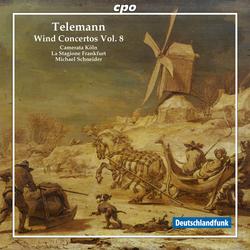 CPO
are doing Telemann proud with their continuing series of the
Violin Concertos (Volume 5 above), chamber and vocal music and
this series of concertos for wind instruments. In some cases
there are few if any rivals to the CPO recordings – this is
not the most popular aspect of Telemann’s œuvre
– which makes them particularly welcome. Though Telemann preferred
to concentrate on the Ouverture-Suite form, there’s some beautiful
music to be heard here.
CPO
are doing Telemann proud with their continuing series of the
Violin Concertos (Volume 5 above), chamber and vocal music and
this series of concertos for wind instruments. In some cases
there are few if any rivals to the CPO recordings – this is
not the most popular aspect of Telemann’s œuvre
– which makes them particularly welcome. Though Telemann preferred
to concentrate on the Ouverture-Suite form, there’s some beautiful
music to be heard here.
Though Johan van Veen concluded his review
of Volumes 4 and 5 with the wish to hear the rest of the series,
we don’t seem ever to have progressed to Volume 6 and beyond,
but we appear not to be the only offenders in that regard: I
can’t find anything more recent than Volume 5 in the Gramophone
archive. Let me assure you, then, that apart from the ambiguity
about exactly which version of TWV53:D1 is performed on Volume
6, these two further releases are just as recommendable as their
predecessors.
The lossless recording from emusic.com is excellent and comes
at the same price as the mp3 but classicsonline.com’s mp3 only
costs even less, £4.99, and comes with pdf booklet. It’s
the full booklet for Volume 6 and a cut-down 5-page affair for
Volume 8, but that’s better than eclassical.com’s booklet-free
zone.
I didn’t have time to complete my roundup of Telemann with recordings
of the Paris Quartets on Channel Classics and CPO; I hope to
include these, together with two Channel Classics recordings
of Florilegium in Telemann’s Tafelmusik, in the next
DL News.
Johann Sebastian BACH (1685-1750)
Keyboard Concertos Volume 1
Concerto No.1 in d minor, BWV1052 [22:08]
Concerto No.2 in E, BWV1053 [20:34]
Concerto No.5 in g minor, BWV1056 [9:48]
Concerto in the Italian Style in F for solo harpsichord, BWV971
[13:03]
Aapo Häkkinen (harpsichord)
Helsinki Baroque Orchestra – rec. May 2010. DDD.
Pdf booklet included
ÆOLUS AE-10057 [65:34] – from classicsonline.com
(mp3) or stream from Naxos Music Library
 Two
potentially contentious issues regarding this new recording
are frankly addressed by Aapo Häkkinen in the notes: the
use of a harpsichord with 16' stop – a copy of an instrument
from 1760 – and the employment of organ continuo. A later note
even admits that the date painted on the Hass original, 1710,
is a forgery, presumably committed by someone who wanted to
convince everyone that JSB would have used such an instrument;
the instrument actually post-dates Bach’s death.
Two
potentially contentious issues regarding this new recording
are frankly addressed by Aapo Häkkinen in the notes: the
use of a harpsichord with 16' stop – a copy of an instrument
from 1760 – and the employment of organ continuo. A later note
even admits that the date painted on the Hass original, 1710,
is a forgery, presumably committed by someone who wanted to
convince everyone that JSB would have used such an instrument;
the instrument actually post-dates Bach’s death.
The weight of evidence adduced for instruments with 16' tone
seems conclusive, though I can’t pretend to scholarly knowledge
in the matter and I generally dislike bottom-heavy sound in
Bach’s keyboard music for harpsichord or organ. In the matter
of the use of organ continuo the evidence seems less convincing:
the best that Häkkinen can claim is that ‘it does
not seem too far-fetched’.
The proof of all puddings is in the eating and neither of these
issues caused me as much concern in the event as I had expected.
There is, naturally, a greater weight of sound at the lower
end of the spectrum but there’s plenty of top end, too. If anything,
the string players sound a little too top-heavy at times; certainly
their playing is less accomplished than Häkkinen’s, though
the recording, otherwise, very good, may be at fault in giving
the soloist a little too much prominence.
I look forward to the rest of this series – at least, I assume
that ‘Volume 1’ contains the promise of more to come –
but with rather less enthusiasm than to the next volume of Matthew
Halls’ series on Linn (Volume 1, CKD410 – see review:
Recording of the Month – and review).
Where that recording overlap with Häkkinen’s, in BWV1052,
my preference is marginally for Halls. The Linn is also available
in SACD and Studio Master download formats.
George Frideric HANDEL (1685-1759)
Ombra cara
Amadigi di Gaula (1715): Aria Sento la gioia (III, 6)
[4:39]
Agrippina (1709): Otton, Otton [1:18 ]
Aria Voi, che udite il mio lamento (II, 5) [6:02]
Riccardo primo, re d’Inghilterra (1727): Aria Agitato da
fiere tempeste (I, 6) [4:05]
Tolomeo, re d’Egitto (1728): Recitativo Che più
si tarda omai / Accompagnato Inumano fratel [2:09]
Aria Stille amare (III, 6) [5:32]
Orlando (1733): Act II, Scene 11, Accompagnato Ah! Stigie
larve / Arioso Già latra Cerbero / Accompagnato Ma la
furia / Aria Vaghe pupille [8:13]
Rodrigo (1707): Passacaille (Ouverture) [4:38]
Radamisto, HWV 12: Act II, Scene 2, Aria Ombra cara di
mia sposa [9:31]
Rodelinda (1725): Fra tempeste funeste (II, 4) [4:46]
Con rauco mormorio (II, 5) [7:12]
Orlando: Act I, Scene 9, Recitativo T’ubbidirò,
crudele / Aria Fammi combattere [3:54]
Sosarme, HWV 30: Act II, Duetto, Per le porte del tormento*
[9:38]
Bejun Mehta (counter-tenor); Rosemary Joshua (soprano)*
Freiburg Baroque Orchestra/René Jacobs – rec. 2009? DDD.
HARMONIA MUNDI HMC902077 (31009884) [71:37] –
from eclassical.com
(mp3, 16– and 24-bit lossless)
 This
is another first-class result of eclassical.com’s obtaining
the rights to offer lossless recordings from the Harmonia Mundi
stable. We’ve covered several of Bejun Mehta’s contributions
to various Handel operas, but we seem to have missed this beautifully
sung recital when it appeared in late 2010. Mehta’s is a powerful
voice, quite distinct from, say, Andreas Scholl or Philippe
Jaroussky, though perhaps closer in timbre to the latter. His
performance of Ah! Stigie larve (track 7), in which he
achieves his effect without laying on the emotion with a trowel,
is second only to the superb Janet Baker’s whom I heard at Sadler’s
Wells many moons ago. With excellent direction from René
Jacobs and ideal recording, as heard in the 24-bit form, this
is a winner in preference to or at least equal with the finest
Handel recitals currently available.
This
is another first-class result of eclassical.com’s obtaining
the rights to offer lossless recordings from the Harmonia Mundi
stable. We’ve covered several of Bejun Mehta’s contributions
to various Handel operas, but we seem to have missed this beautifully
sung recital when it appeared in late 2010. Mehta’s is a powerful
voice, quite distinct from, say, Andreas Scholl or Philippe
Jaroussky, though perhaps closer in timbre to the latter. His
performance of Ah! Stigie larve (track 7), in which he
achieves his effect without laying on the emotion with a trowel,
is second only to the superb Janet Baker’s whom I heard at Sadler’s
Wells many moons ago. With excellent direction from René
Jacobs and ideal recording, as heard in the 24-bit form, this
is a winner in preference to or at least equal with the finest
Handel recitals currently available.
Better still, by a most fortunate coincidence, there’s no overlap
between this recital and James Bowman sings Handel Heroic
Arias (Hyperion CDH55370 [76:11], budget price,
with the King’s Consort) which I recommended in the July 2012/2
Roundup.
The Hyperion comes complete with booklet; the Harmonia Mundi,
sadly, is text-free. Having paid $19.34 for the 24-bit download,
you may well feel entitled to the texts. You will, however,
find some video trailers and information on the Harmonia Mundi
website – here (click on ‘in pictures’).
Joseph HAYDN (1732-1809)
Symphony No.22 in E-flat (Philosopher)
Vienna State Opera Orchestra/Max Goberman
BEULAH EXTRA 42-45BX112 [18:03] – from eavb.co.uk
(mp3)
Symphony No.24 in d minor
Vienna State Opera Orchestra/Max Goberman
BEULAH EXTRA 36-39BX112 [16:45] – from eavb.co.uk
(mp3)
Symphony No.41 in C
Vienna State Opera Orchestra/Max Goberman
BEULAH EXTRA 32-35BX112 [17:58] – from eavb.co.uk
(mp3)
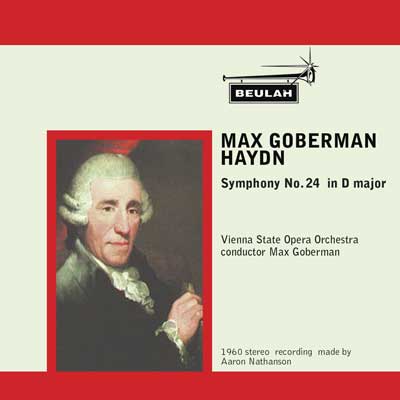 These
versions of Symphonies Nos. 24 and 41 are also included on two
recent Beulah albums available from iTunes, which I reviewed
in the 2013/2 Download News (1PD55 and 2PD55 respectively).
I’ve already praised several recordings from the incomplete
series which Max Goberman made with the VSOO; it was ahead of
its time in employing the authentic HC Robbins Landon text and
somehow Goberman managed to make the orchestra sound much better
than their normal workaday selves, but that’s less surprising
considering his versatility, from Broadway, where he conducted
the premiere of West Side Story, to film music, to ballet.
Though the series was never completed on his own LP label –
even less so on CBS Odyssey – I’m grateful for these brands
which Beulah have saved from the burning and hope that we shall
have many more; his version of Symphony No.48 is something of
a collector’s item. The recordings have come up very well.
These
versions of Symphonies Nos. 24 and 41 are also included on two
recent Beulah albums available from iTunes, which I reviewed
in the 2013/2 Download News (1PD55 and 2PD55 respectively).
I’ve already praised several recordings from the incomplete
series which Max Goberman made with the VSOO; it was ahead of
its time in employing the authentic HC Robbins Landon text and
somehow Goberman managed to make the orchestra sound much better
than their normal workaday selves, but that’s less surprising
considering his versatility, from Broadway, where he conducted
the premiere of West Side Story, to film music, to ballet.
Though the series was never completed on his own LP label –
even less so on CBS Odyssey – I’m grateful for these brands
which Beulah have saved from the burning and hope that we shall
have many more; his version of Symphony No.48 is something of
a collector’s item. The recordings have come up very well.
Wolfgang Amadeus MOZART (1756-1791)
Piano Concerto No.17 in G, K453
Hans Richter-Haaser (piano)
Philharmonia Orchestra/István Kertész – rec. 1960.
ADD/stereo
BEULAH EXTRA 4-6BX173 [27:29] – from eavb.co.uk
(mp3)
 Competition
is very strong in this, as in all the mature Mozart piano concertos.
From the ADD/stereo era alone, Géza Anda with the Salzburg
Mozarteum Camerata (Nos.6, 17 and 21, DG Originals 447 463-2)
makes an excellent benchmark and Brendel’s even older Vox recording
with the VSOO and Paul Angerer remains a bargain option on various
Regis, Alto and Vox combinations – review.
Competition
is very strong in this, as in all the mature Mozart piano concertos.
From the ADD/stereo era alone, Géza Anda with the Salzburg
Mozarteum Camerata (Nos.6, 17 and 21, DG Originals 447 463-2)
makes an excellent benchmark and Brendel’s even older Vox recording
with the VSOO and Paul Angerer remains a bargain option on various
Regis, Alto and Vox combinations – review.
Hans Richter-Haaser, with strong support from István
Kertész, whose contribution also helps make Clifford
Curzon’s Decca recording of the later concertos (20, 23-24 and
26-27, 468 4912)) so effective, comes out well by comparison.
He dispatches all three movements a little more expeditiously
than Anda or Mitsuko Uchida and Jeffrey Tate (Nos.9, 14, 16,
17 and 18, Decca 473 3132, 2CDs at budget price) without
sounding hurried, and the recording has come up well in this
transfer. Well worth considering in my estimation, though I
see that Jeremy Noble in 1962 was unimpressed with what he called
the Dresden-china school of Mozart when this recording first
appeared in tandem with Concerto No.26; he was much happier
with Géza Anda a few months later and that remains the
stronger recommendation.
Wolfgang Amadeus MOZART
Symphony No.41 in C, K551 (Jupiter)
Berlin Philharmonic Orchestra/Karl Böhm – rec. 1962. ADD/stereo
BEULAH EXTRA 10-13BX133 [26:52] – from eavb.co.uk
(mp3)
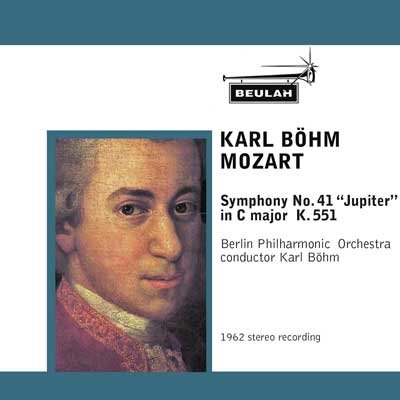 Unlike
Goberman’s Haydn from around the same time, this is not a ground-breaking
interpretation, but it is equally recommendable – ‘traditional’
Mozart performance at its best performed by a world-class orchestra
and still sounding remarkably well in this transfer. If I marginally
prefer Bruno Walter’s Columbia SO Jupiter of similar
vintage (Sony 88697906832, 6CDs), that’s more to do with
familiarity: I owned the CBS LP which coupled his Haffner
and Jupiter and still dig out my 2-CD set of Walter’s
last six Mozart symphonies.
Unlike
Goberman’s Haydn from around the same time, this is not a ground-breaking
interpretation, but it is equally recommendable – ‘traditional’
Mozart performance at its best performed by a world-class orchestra
and still sounding remarkably well in this transfer. If I marginally
prefer Bruno Walter’s Columbia SO Jupiter of similar
vintage (Sony 88697906832, 6CDs), that’s more to do with
familiarity: I owned the CBS LP which coupled his Haffner
and Jupiter and still dig out my 2-CD set of Walter’s
last six Mozart symphonies.
It’s often instructive to look back at what was originally said
about recordings like this which have developed classic status;
surprisingly, Böhm’s original LP coupling of Nos. 40 and
41 was given something of a cold shoulder by Edward Greenfield,
no less – nothing like the same imaginative individuality as
Beecham’s coupling of the same two works and No.40; pale and
unmemorable by comparison with Colin Davis’s versions of 39
and 40, reviewed the same month. Like most of us, EG has mellowed:
the last complete Penguin Guide (2010), written by the
quadrumvirate of which EG is part, describes Böhm’s late
Mozart symphonies as broader and heavier in texture than is
now usual but warm, magnetic and with an attractive honesty
and strength. It’s the 2010 judgement rather than that of 1962
with which I concur.
Böhm’s recordings of Symphonies Nos. 35, 36 and 38-41 remain
available on an inexpensive 2-CD DG Originals set (447 4162),
39-41 on Eloquence 463 2322, and the complete symphonies
are on a 10-disc collection (477 6134) but the equally
inexpensive Beulah transfer is ideal for anyone who just wants
the Jupiter symphony.
Ludwig van BEETHOVEN (1770-1827)
Violin Concerto
Alfredo Campoli (violin)
London Symphony Orchestra/Josef Krips – rec. 1952. ADD/mono
BEULAH EXTRA 14BX10 [44:20] – from eavb.co.uk
(mp3)
Pyotr Ilyich TCHAIKOVSKY (1840-1893)
Violin Concerto
Alfredo Campoli (violin)
London Symphony Orchestra/Ataulfo Argenta – rec. 1956. ADD/stereo
BEULAH EXTRA 16BX10 [33:45] – from eavb.co.uk
(mp3)
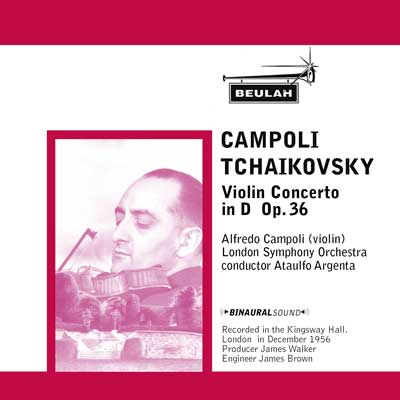 These
two classic recordings have been available on CD for some time
on Beulah 5PD10 and the Tchaikovsky is also included
in Decca’s 50-CD set Decca Sound (478 2826).
These
two classic recordings have been available on CD for some time
on Beulah 5PD10 and the Tchaikovsky is also included
in Decca’s 50-CD set Decca Sound (478 2826).
Rob Barnett welcomed the first appearance of these reissues,
the Beethoven coupled with Bruch and the Tchaikovsky with Bliss
– review
– though noting that not everyone will now approve of the edition
employed for Tchaikovsky. That’s not something that I found
at all troubling – it certainly didn’t spoil my enjoyment of
this reissue of an old friend which, in many respects is still
my benchmark for this concerto. The recording still sounds extremely
well. For some more recent recordings of the Tchaikovsky, please
see below.
Though in early 1950s mono, the Beethoven has been made to sound
unbelievably well in this transfer. The performance may not
have quite the immediate appeal of the Tchaikovsky, but with
able assistance from Josef Krips, who later recorded a very
worthwhile cycle of the Beethoven symphonies, it certainly does
great justice to a work which I recently heard Nicola Benedetti
describe, with considerable justice, I think, as her favourite.
Anton BRUCKNER (1824-1896)
Symphony No. 7 in E major (1881-1883) (1885, ed. Haas) [60:02]
BBC Scottish Symphony Orchestra/Donald Runnicles – rec. 2012.
DDD
Pdf booklet included
HYPERION CDA67916 [60:02] – from hyperion-records.co.uk
(mp3, 16/44.1 & 24/96 lossless)
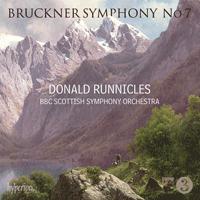 My
thanks to Geoff Molyneux for this review: you’ll find my
thoughts on this recording in the 2012/24
News and Dan Morgan’s in the 2013/1
News.
My
thanks to Geoff Molyneux for this review: you’ll find my
thoughts on this recording in the 2012/24
News and Dan Morgan’s in the 2013/1
News.
From the very opening bars it is clear that we are about to
hear a first class performance of this work. The first theme,
elegiac in character, is given by violas and cellos in unison
and they play with a ravishing, really beautiful tone with sensitive
and expressive phrasing and dynamics. The violins and woodwind
are equally impressive when they repeat the theme a few bars
later. The ensemble and intonation is faultless, and to my ears
beyond criticism. The recording by Hyperion is wide in dynamic
range, clearly very important in the music of Bruckner. The
fortissimos are majestic and convincing.
I first got to know the late symphonies of Bruckner in live
performances and recordings under Klemperer, Karajan and Giulini.*
This new recording sounds very different in many ways, lighter
and faster sometimes. Actually Klemperer’s Scherzo is the same
speed as that of Runnicles, but the former seems more convincing
and more rugged. Otto Klemperer and the New Philharmonia are
magisterial, even if the second movement Adagio seems a bit
slow compared with today’s performance style. Listening again
to these recordings after many years, I can’t help feeling that
both Klemperer and Karajan build their climaxes with greater
power and conviction than Runnicles, and the sound quality of
these old discs is still pretty good. Karajan is rather nearer
to Runnicles than Klemperer because beauty of sound is of paramount
importance. When the New Philharmonia woodwind play the repeat
of the first theme in the first movement we are aware of a comparatively
rough tone and occasional shaky intonation.
I was surprised by the fastish tempo of the finale opening under
Runnicles, with its crisp, light and dancing rhythmic feel.
But it is very effective and a thoroughly modern approach to
this music. At figure F this rhythmic theme returns on full
orchestra, fortissimo to magnificent effect. Runnicles
always keeps the music moving.
I feel that the recording is just a little too resonant, consistent
with the attempt to achieve beauty of tone. Sometimes I would
like greater clarity, for example the timpani rhythm at the
opening of the Trio section of the scherzo can barely be heard
and does not sound clearly articulated. At the opening of the
first movement, the dynamic contrast between the string tremolando
accompaniment marked pianissimo and the main theme marked
mezzo forte is so wide that the accompaniment can hardly
be heard. Contrast this with the Klemperer and you will have
a much better balance with such detail clearly audible and articulated.
So this new performance under Donald Runnicles is magnificent
with state of the art recording quality. It is well worth hearing
but don’t throw away your great recordings from the past.
Geoffrey Molyneux
* Klemperer’s recordings of Bruckner
Symphonies 4-9 have recently been very economically reissued
by EMI Classics on 4042962 – you should find the six-CD
set on sale for as little as £13. Download from hmvdigital.com
for slightly less.
Pyotr Ilyich
TCHAIKOVSKY (1840 – 1893)
Violin Concerto in D, Op. 35 [34:53]
Sérénade mélancolique for violin
and orchestra, Op. 26 [9:27]
Valse – Scherzo for violin and orchestra, Op. 34 [7:46]
Souvenir d’un lieu cher for violin and piano, Op.
42* [15:54]
Julia Fischer (violin)
Russian National Orchestra/Yakov Kreizberg (piano*) – rec. 2006.
DSD.
Pdf booklet included
PENTATONE PTC5186095 [68:25] – from eclassical.com
(mp3, 16– and 24-bit lossless)
Violin Concerto in D, Op.35 [31:43]
Piano Concerto No.1 in b-flat minor, Op.23 [35:50]
Christian Tetzlaff (violin)
Nikolai Lugansky (piano)
Russian National Orchestra/Kent Nagano – rec. 2003. DSD.
Pdf booklet included
PENTATONE PTC5186022 [67:52] – from eclassical.com
(mp3, 16– and 24-bit lossless)
Alexander Konstantinovich GLAZUNOV (1865-1936)
Violin Concerto in a minor, Op.82 [18:28]
Pyotr Ilyich TCHAIKOVSKY (1840-93)
Souvenir d’un lieu cher, Op.42 (arranged for violin
and orchestra by Alexander Glazunov) [17:29]
Violin Concerto in D, Op.35 [33:58]
Vadim Gluzman (violin)
Bergen Philharmonic Orchestra/Andrew Litton – rec. 2008. DSD
Pdf booklet included.
BIS-SACD-1432 [70:58] – from eclassical.com
(mp3, 16– and 24-bit lossless)
There are so many first-rate recordings of the Tchaikovsky Violin
Concerto that choice is invidious; I’d be more than happy with
the Beulah/Campoli (above) or with any of the versions
listed below.
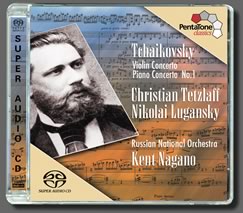
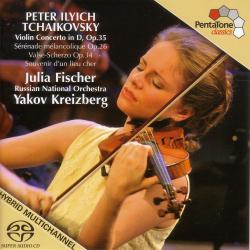 The
two Pentatone recordings are complementary; if you like
the Violin Concerto to be a little on the dreamy side, but not
unduly so, go for Julia Fischer who, though slower than
Alfredo Campoli (above), perhaps under the influence of Yakov
Kreizberg, still keeps the music moving and never overdoes the
tendency to linger. Christian Tetzlaff, on the other
hand, shaves a few minutes off Campoli’s timings without ever
sounding rushed. Both Fischer and Tetzlaff receive excellent
orchestral support and both are well recorded, especially in
24-bit, for which it’s well worth paying the extra, albeit at
almost twice the price of mp3 and 16-bit.
The
two Pentatone recordings are complementary; if you like
the Violin Concerto to be a little on the dreamy side, but not
unduly so, go for Julia Fischer who, though slower than
Alfredo Campoli (above), perhaps under the influence of Yakov
Kreizberg, still keeps the music moving and never overdoes the
tendency to linger. Christian Tetzlaff, on the other
hand, shaves a few minutes off Campoli’s timings without ever
sounding rushed. Both Fischer and Tetzlaff receive excellent
orchestral support and both are well recorded, especially in
24-bit, for which it’s well worth paying the extra, albeit at
almost twice the price of mp3 and 16-bit.
Choice of coupling could well determine your choice, with a
good performance of the Piano Concerto on offer from Nikolai
Lugasky as companion to Tetzlaff. On the other hand, Fischer’s
heartfelt performance of the Sérénade melancolique
suits the music very well.
Actually, though the Fischer version of the first movement seems
to linger longer over the scenery, as it were, it’s only a few
second slower than Campoli. The difference is most marked in
the slow movement, which takes a minute longer than from Tetzlaff
but who can complain when the music is made to sound so beautiful?
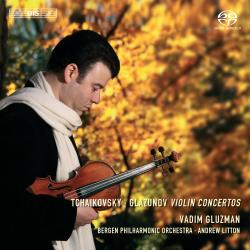
If the coupling of the Violin and First Piano Concertos is logical,
though not very common*, the combination of the Tchaikovsky
and Glazunov Violin Concertos on BIS, with Glazunov’s
arrangement of the Souvenir d’un lieu cher, also
makes excellent sense. While the Glazunov Violin Concerto is
no match for the Tchaikovsky, it’s well worth having in such
a fine performance, easily excelling my old IMP CD with a decent
performance by Hideko Udagawa which now goes off to the charity
shop (PCD966, no longer available).
* There’s a Kogan/Cziffra coupling
on EMI Red Line and there used to be a recommendable budget-price
RCA Silver Seal recording from the mid-1960s: John Browning
(piano) and Erick Friedman (violin) with the LSO and Seiji Ozawa,
second-hand copies of which are worth looking out for (VD60491),
though not at £29.97, which one dealer is currently asking.
Sainsburysentertainment.co.uk
offer Sarah Chang’s EMI recording of the Tchaikovsky
Violin Concerto, with the LSO and Colin Davis and coupled with
four of Brahms’ Hungarian Dances in mp3 for £4.99 but
it’s rather ungenerous in timing at 48 minutes. For the same
tempting price hmvdigital.com
offer Kyung-Wha Chung in the Sibelius and Tchaikovsky
concertos on Decca Originals – see March 2010 Roundup,
but ignore the passionato link given there.
Other recommendable Glazunov recordings containing the Violin
Concerto include:

The Seasons, ballet, Op.67 [35:34]
Violin Concerto in a minor, Op.82 [20:48]
Oscar Shumsky (violin); RSNO/ Neeme Järvi – rec. 1987
Pdf booklet included
CHANDOS CHAN8596 [56:22] – from theclassicalshop.net
(mp3 and lossless) or stream from Naxos Music Library
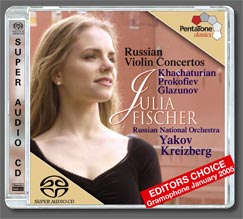 Aram
KHACHATURIAN (1903-1978) Violin Concerto in d minor
(1940) [36.38]
Aram
KHACHATURIAN (1903-1978) Violin Concerto in d minor
(1940) [36.38]
Serge PROKOFIEV (1891-1953)
Violin Concerto No. 1 in D, Op. 19 (1917) [22.00]
Alexander GLAZUNOV (1856-1936)
Violin Concerto in a minor, Op. 82 (1905) [20.28]
Julia Fischer (violin)
Russian National Orchestra/Yakov Kreizberg – rec. 2004. DSD
Pdf booklet included
PENTATONE CLASSICS PTC5186059 [79:24] – from eclassical.com
(mp3, 16– and 24-bit lossless) or stream from Naxos Music Library
[see review
by Paul Shoemaker: NB slightly incorrect catalogue number in
that review – correctly as above]
If you’re looking for the Glazunov Violin Concerto in the context
of his other concertos, the inexpensive 2-CD conducted by José
Serebrier (Warner 2564679465 – review)
can be downloaded from hmvdigital.com
or streamed from Naxos Music Library.
The impecunious will find Maxim Vengerov’s performance, coupled
with the two Prokofiev concertos and conducted by Mstislav Rostropovich
for £2.99 at sainsburysentertainment.co.uk
 For
an inexpensive alternative version of The Seasons, coupled
with Scènes de Ballet, you won’t go far wrong
with Ondré Lenard and the Slovak RSO on HNH Amadis 7178;
I’ve owned and enjoyed the Naxos CD of this performance
of The Seasons, differently coupled, for a considerable
time. From eclassical.com
in mp3 and lossless – and less expensive, at $7.85, than
their download of exactly the same performances on the Marco
Polo label. There’s also a classic Ansermet recording on
an inexpsnsive 2-CD release from Australian Eloquence, which
I recommended some time ago - review.
For
an inexpensive alternative version of The Seasons, coupled
with Scènes de Ballet, you won’t go far wrong
with Ondré Lenard and the Slovak RSO on HNH Amadis 7178;
I’ve owned and enjoyed the Naxos CD of this performance
of The Seasons, differently coupled, for a considerable
time. From eclassical.com
in mp3 and lossless – and less expensive, at $7.85, than
their download of exactly the same performances on the Marco
Polo label. There’s also a classic Ansermet recording on
an inexpsnsive 2-CD release from Australian Eloquence, which
I recommended some time ago - review.
Antonín DVOŘÁK (1841-1904)
Symphony No.6 in D, Op. 60, B112 (1880) [47:48]
Leoš JANÁČEK (1854-1928)
Idyll, JW VI/3 (1878) [29:31]
Seattle Symphony/Gerard Schwarz – rec. May 2009 and October
2011. DDD.
Pdf booklet included
NAXOS 8.572698 [77:19] – from classicsonline.com
(mp3) or stream from Naxos Music Library
Antonín DVOŘÁK (1841-1904)
Symphony No. 3 in E flat, Op.10, B34 [34:10]
Symphony No. 6 in D, Op.60, B112 (1880) [45:47]
Bournemouth Symphony Orchestra/José Serebrier
WARNER CLASSICS 825646577521 [79:57] – from classicsonline.com
(mp3) or stream from Naxos Music Library
There are several reviews in this Download News which I wrote
in time for 2013/2 but kept back because I thought that I’d
been unduly critical. In this case, I enjoyed the Serebrier
recording of the Sixth Symphony more than the Schwarz, but wondered
if I hadn’t been too hard on the latter. On reflection, however,
I still prefer Serebrier.
These are two very well filled releases of Dvořák, both
of which contain the Sixth Symphony. There’s some very strong
competition in this work, principally from Sir Charles Mackerras
(Supraphon), Marin Alsop (Naxos rivalling themselves here –
see January 2011 Roundup
for a comparison of Alsop and Mackerras) and Jiří Bělohlávek
(Chandos).
 On
the face of it the Warner coupling of two symphonies seems more
logical than the Naxos arrangement, but Janáček was in
many ways Dvořák’s musical heir and the older composer
has been described as the spiritual godfather of the Idyll,
so Gerard Schwarz’s coupling is equally logical. This
is not, it seems, a reissue from the Delos back catalogue, but
a release of two recent recordings from a conductor who has
also recently been recording the French repertoire with the
Lyons orchestra for Naxos.
On
the face of it the Warner coupling of two symphonies seems more
logical than the Naxos arrangement, but Janáček was in
many ways Dvořák’s musical heir and the older composer
has been described as the spiritual godfather of the Idyll,
so Gerard Schwarz’s coupling is equally logical. This
is not, it seems, a reissue from the Delos back catalogue, but
a release of two recent recordings from a conductor who has
also recently been recording the French repertoire with the
Lyons orchestra for Naxos.
In the first movement of the Sixth Symphony Schwarz plays around
with the tempo a little too much for my liking – sometimes speeding
up, more often broadening the pace. I’m not asking for a boringly
unyielding speed and unremitting tension, but I would like something
more consistent than this. That something might be more like
Mackerras, who also varies the tempo occasionally but within
a basic forward motion. At least, like Serebrier (below) and
Alsop, he observes the important repeat, which Mackerras and
Bělohlávek omit, though I’d still give Mackerras’s Supraphon
recording top billing and place the Chandos Bělohlávek
not far behind.
In mitigation I should add that another review which I’ve
since read finds Schwarz preferable to Serebrier; whereas I
think that Schwarz makes the first movement sound a little too
episodic, it’s Serebrier’s ritardando that he thinks
a trifle overdone. In the slow movement, too, where I think
Schwarz just a little too slow, it’s possible to regard his
broader tempo as magical. On the other hand, yet another review
finds the scherzo, which I liked, lacking rhythmically. All
of which provides a good illustration of the fact that there’s
no absolute opinion on any performance and a good reason to
try this yourself, from Naxos Music Library if possible.
At least we agree in liking the Janáček coupling – not
typical of the composer but very easy on the ear and very well
performed and recorded – together with the attractive price
it goes quite some way towards making the whole programme more
compelling.
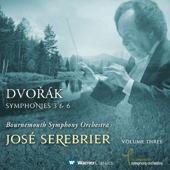 José
Serebrier may not quite match the strong challengers that
I’ve mentioned, but he comes very close indeed. I wasn’t
entirely convinced by his recording of the Ninth – November
2011/2 Roundup
– or the Seventh – September 2012/1 Roundup,
but this time he seems more idiomatic and more competitive –
after all, he did once conduct the Czech Philharmonic, so the
music is in his blood. With just a few reservations – the broadening
of the tempo towards the end of the first movement doesn’t quite
work, for example; here I do agree with the reviewer who prefers
Schwarz – and with good mp3 sound, if the coupling appeals you
could do much worse.
José
Serebrier may not quite match the strong challengers that
I’ve mentioned, but he comes very close indeed. I wasn’t
entirely convinced by his recording of the Ninth – November
2011/2 Roundup
– or the Seventh – September 2012/1 Roundup,
but this time he seems more idiomatic and more competitive –
after all, he did once conduct the Czech Philharmonic, so the
music is in his blood. With just a few reservations – the broadening
of the tempo towards the end of the first movement doesn’t quite
work, for example; here I do agree with the reviewer who prefers
Schwarz – and with good mp3 sound, if the coupling appeals you
could do much worse.
The Third Symphony gets far fewer outings than the Sixth, though
it doesn’t deserve the oblivion to which the composer sought
to consign it when he chose only five of his symphonies to receive
numbers. It receives a sympathetic performance here and one
which makes this new recording preferable to Naxos’s identical
coupling from the Slovak PO and Stephen Gunzenhauser, though
that offers a very serviceable pairing of the same two symphonies
on a CD which I have played frequently since I bought it some
twenty years ago. That remains available for just £4.99
from classicsonline.com
as against £7.99 for the Warner and it comes with the
booklet that the latter lacks, so both it and the Marin Alsop
version of No.6, with Nocturne and Scherzo capriccioso
– also with booklet – are well worth considering as a bargain.
Marin Alsop’s 6th is also available coupled with the 9th on
a Blu-ray audio disc (Naxos NBD0014).
Edvard GRIEG (1843-1907)
Peer Gynt – excerpts [39:23]
Piano Concerto in a minor, Op16 [29:15]
Clifford Curzon (piano)
London Symphony Orchestra/Øivin Fjeldstad – rec.c.1958/9.
ADD
DECCA THE CLASSIC SOUND 448 5992 [68:38] – from hmvdigital.com
(mp3). On CD onlyfrom Arkivmusic.com or in a 23-disc set, Decca
478 4389.
Peer Gynt Suite No. 1, Op.46 (1874/88) [15:34]
Peer Gynt Suite No. 2, Op.55 (1891-2) [17:15]
Funeral March in Memory of Rikard Nordraak (1866/92) [7:52]
Old Norwegian Melody with Variations, Op.51 (1891/1904) [24:29]
Bell Ringing, Op.54/6 (1904) [3:59]
Bergen Philharmonic/Ole Kristian Ruud – rec. 2003-2005. DDD.
Pdf booklet included
BIS BIS-SACD-1591 [70:50] – from eclassical.com
(mp3, 16– and 24-bit lossless)
[see review
by Stephen Francis Vasta: Recording of the Month]
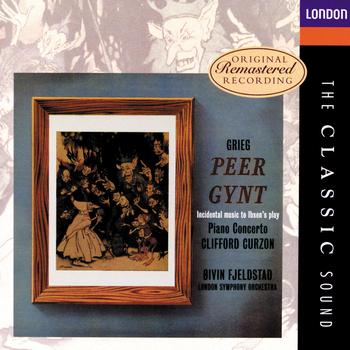
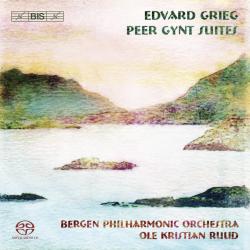 The
Decca recording is a very old favourite – I owned the
Piano Concerto on a 10" LP and, later, the Peer Gynt
extracts – slightly more than the two suites but minus Ingrid’s
Lament – on Ace of Diamonds but it’s not just nostalgia
that still makes me place this top of the list for both works
and regret its absence on a single CD, which is all the more
reason to welcome the fact that it’s still available in good
(320kb/s) mp3 from hmvdigital.com. The 18/– that I paid for
the Piano Concerto alone would equate to at least £25
in modern terms, so the asking price of £7.99 is very
reasonable. I reviewed this as a lossless download from passionato.com
some time ago, but they are no longer in the download business,
so you’ll need to turn to the hmvdigital.com download.
You’d hardly think that these recordings date from a time of
politeness so long ago that the Gramophone reviewer referred
to the conductor as ‘Mr Fjeldstad’.
The
Decca recording is a very old favourite – I owned the
Piano Concerto on a 10" LP and, later, the Peer Gynt
extracts – slightly more than the two suites but minus Ingrid’s
Lament – on Ace of Diamonds but it’s not just nostalgia
that still makes me place this top of the list for both works
and regret its absence on a single CD, which is all the more
reason to welcome the fact that it’s still available in good
(320kb/s) mp3 from hmvdigital.com. The 18/– that I paid for
the Piano Concerto alone would equate to at least £25
in modern terms, so the asking price of £7.99 is very
reasonable. I reviewed this as a lossless download from passionato.com
some time ago, but they are no longer in the download business,
so you’ll need to turn to the hmvdigital.com download.
You’d hardly think that these recordings date from a time of
politeness so long ago that the Gramophone reviewer referred
to the conductor as ‘Mr Fjeldstad’.
Clifford Curzon’s earlier (1951) mono recording of the Piano
Concerto, with Anatole Fistoulari, is available from Beulah
(6-8BX7, October 2011/1 Roundup).
Øivin Fjeldstad offers ten items from the complete Peer
Gynt music whereas most perform just the two suites which
Grieg excerpted, eight items in all, so the Ruud recording
on BIS falls a little short in that respect but it’s recommendable
on all other counts, not least in that it offers some less standard
Grieg for those who don’t want the Curzon Piano Concerto or
already own it.
Nikolay RIMSKY KORSAKOV (1844-1908)
Symphony No.1 in e minor, Op.1 (second version, 1884) [25:18]
Fantasy on Serbian Themes, Op.6 (second version, 1887) [6:46]
Symphony No.3 in C, Op.32 (second version, 1886) [33:51]
Malaysian Symphony Orchestra/Kees Bakels – rec. November 2002,
DDD.
Pdf booklet included
BIS BIS-CD-1477 [66:48] – from eclassical.com
(mp3 and lossless) or stream from Naxos Music Library
[‘Recommended for the Third Symphony.’ See review
by Stephen Francis Vasta.]
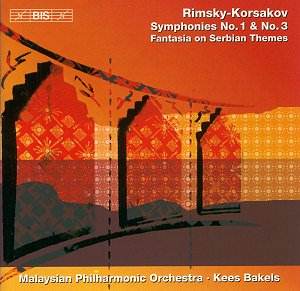 The
First Symphony is attractive enough, but it doesn’t ‘go’
anywhere. My wife makes the same comment about the Balakirev
Symphony No.1 and I suppose that she’s right, but that work
is packed with good tunes in a way that Rimsky’s First isn’t
quite. The Third is a different matter and it receives a fine
performance here. With the booklet of notes included and good
recording, especially in lossless format, this is a worthwhile
release, but I’d go for the Second Symphony, Antar, first
if you don’t already know that work: see below.
The
First Symphony is attractive enough, but it doesn’t ‘go’
anywhere. My wife makes the same comment about the Balakirev
Symphony No.1 and I suppose that she’s right, but that work
is packed with good tunes in a way that Rimsky’s First isn’t
quite. The Third is a different matter and it receives a fine
performance here. With the booklet of notes included and good
recording, especially in lossless format, this is a worthwhile
release, but I’d go for the Second Symphony, Antar, first
if you don’t already know that work: see below.
For the Chandos recording of Symphonies Nos. 1-3, Russian
Easter Festival Overture, Capriccio espagnol and
Piano Concerto (CHAN6613, Bergen PO/Kitaienko) and the
Philharmonia/Svetlanov recording of the Antar Symphony
(No.2) and Russian Easter Festival Overture on Hyperion
Helios (CDH55137), both inexpensive releases, please
see March 2010 Download Roundup.
The booklet of notes, which I reported previously as unavailable,
now comes with the Chandos download; the Hyperion also comes
with a booklet.
Luigi DENZA (1846-1922)
Funiculi funiculà [2:43]
Regimental Band of the Coldstream Guards/Lt-Colonel Douglas
A Pope – rec. 1959. ADD/stereo.
BEULAH EXTRA 5BX203 [2:43] – from eavb.co.uk
(mp3)
 This
is one of many railway-inspired pieces of music, in this case
the funicular railway up Mount Vesuvius. It’s also the music
that got Richard Strauss into copyright problems – thinking
that it was a Neapolitan folk song, he incorporated into Aus
Italien, for which he had to pay royalties. It receives
a suitably jaunty performance here and the recording still sounds
well.
This
is one of many railway-inspired pieces of music, in this case
the funicular railway up Mount Vesuvius. It’s also the music
that got Richard Strauss into copyright problems – thinking
that it was a Neapolitan folk song, he incorporated into Aus
Italien, for which he had to pay royalties. It receives
a suitably jaunty performance here and the recording still sounds
well.
Beulah also offer in conjunction with iTunes,
a whole album transcribed from the Guards’ 1959 stereo release
on RCA (1PD51). There’s also a 1962 stereo recording
from the CWS Manchester Band and Alex Mortimer of Elgar’s
Pomp and Circumstance March No. 4 (Beulah Extra 1BX259).
Sir Edward ELGAR (1857-1934)
Bach Fantasia and Fugue in c minor, BWV537 [8:21]
London Philharmonic Orchestra/Sir Adrian Boult – rec. 1949.
ADD/mono
BEULAH EXTRA 46BX12 [8:21] – from eavb.co.uk
(mp3)
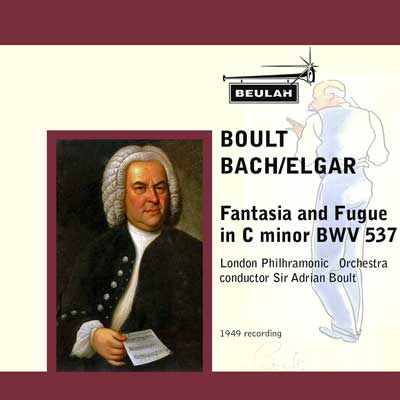 That
such arrangements of Bach have gone out of fashion is not a
matter that I greatly lament – even as long ago as the year
of this recording a Mr HH Fountain was writing to Gramophone
to point out that if Bach had wanted orchestrate his organ works
he would have done so – but I know that there are those who
hanker after them. Though one thinks more immediately of Stokowski
in this context, few will be disappointed with Sir Adrian Boult’s
altogether less heavy-handed performance here. It seems, in
fact, to have been a favourite with Boult, who recorded it again
in the 1970s as a filler to his performance of Falstaff.
The recording shows its age, especially at climaxes, but is
more than acceptable and is largely free from surface noise.
That
such arrangements of Bach have gone out of fashion is not a
matter that I greatly lament – even as long ago as the year
of this recording a Mr HH Fountain was writing to Gramophone
to point out that if Bach had wanted orchestrate his organ works
he would have done so – but I know that there are those who
hanker after them. Though one thinks more immediately of Stokowski
in this context, few will be disappointed with Sir Adrian Boult’s
altogether less heavy-handed performance here. It seems, in
fact, to have been a favourite with Boult, who recorded it again
in the 1970s as a filler to his performance of Falstaff.
The recording shows its age, especially at climaxes, but is
more than acceptable and is largely free from surface noise.
Benjamin BRITTEN (1913-1976)
Symphony for Cello and Orchestra, Op. 68* [31:30]
Sonata for cello and piano in C, Op. 65** [20:38]
Suite No. 1 for cello solo, Op. 72 [24:40]
Suite No. 2 for cello solo, Op. 80 [20:02]
Suite No. 3 for cello solo, Op. 87 [20:57]
Tema ‘Sacher’ [1:34]
Alban Gerhardt (cello)
BBC Scottish Symphony Orchestra/Andrew Manze*
Steven Osborne (piano)**
Pdf booklet included
HYPERION CDA67941/2 [2 CDs: 119:21] – from hyperion-records.co.uk
(mp3 and 16/44.1 and 24/88.2 lossless)
 My
review of this recording was ready to be included in the 2013/2
Download News but I held it back in order to give the performances
a little more time to make their impact on me. In the meantime
I’ve seen another review which also comments on the fast
tempi in the Cello Symphony and the coolness of the soloist’s
approach; though the latter comment is tempered with the observation
that Britten would probably have preferred a more cool-headed
approach, the reviewer ends, like me, in emphasising the uniqueness
of the Rostropovich-Britten recording. In the end I decided
to leave what I had originally written, especially as Geoff
Molyneux has kindly sent me his thoughts on this recording –
appended below. Not only does he give a more rounded and sympathetic
view of the Cello Symphony, he also relates more positively
than me to the three Cello Suites.
My
review of this recording was ready to be included in the 2013/2
Download News but I held it back in order to give the performances
a little more time to make their impact on me. In the meantime
I’ve seen another review which also comments on the fast
tempi in the Cello Symphony and the coolness of the soloist’s
approach; though the latter comment is tempered with the observation
that Britten would probably have preferred a more cool-headed
approach, the reviewer ends, like me, in emphasising the uniqueness
of the Rostropovich-Britten recording. In the end I decided
to leave what I had originally written, especially as Geoff
Molyneux has kindly sent me his thoughts on this recording –
appended below. Not only does he give a more rounded and sympathetic
view of the Cello Symphony, he also relates more positively
than me to the three Cello Suites.
Hyperion bill this as ‘a major new release at the start
of Britten’s anniversary celebrations’. They are certainly
biting off a big chunk in recording the whole of his cello œuvre
when we have the performances of the dedicatee Rostropovich
for comparison; Cello Suites and Sonata, Decca 421 8592;
Cello Symphony with Sinfonia da Requiem and Cantata
Misericordium, Decca E425 1002 [74:35] (download
mp3 from amazon.co.uk),
recordings which I’m hardly likely to pension off. Bargain hunters
will find these, with all Rostropovich’s other Decca recordings,
in a budget 5-CD box 478 3577. There’s an earlier collaboration
between Rostropovich and Rozhdestvensky in the Cello Symphony
on EMI Great Artists – a powerful performance, coupled with
Shostakovich, but in far from ideal mono and with a noisy audience
– review.
I deliberately chose not to listen to either of these for fear
of influencing my judgement.
Chandos have also got their feet firmly wedged in the door with
two strong contenders: a budget-price reissue of Rafael Wallfisch’s
recording with Steuart Bedford of the Cello Symphony (with Death
in Venice Suite, pdf booklet available, CHAN10274X
[61:02] – review:
Bargain of the Month) and a recent full-price
recording from Paul Watkins and Edward Gardner (with Gloriana
Suite and Four Sea Interludes, CHAN10658 – review:
Recording of the Month and March 2011/2 Roundup).
Another rival recording, from Pieter Wispelwey, live with the
Flanders Symphony Orchestra and Seikyo Kim on Onyx (ONYX4058
[63:37], with Cello Suite No.1) pulls no punches, especially
in the first movement, in conveying what a tough work this is.
I’ve listened to this in ‘best’ quality from Naxos Music
Library which encourages me to think that the classicsonline.com
download, with pdf booklet, should sound fine.
By comparison with the Onyx, the new Hyperion recording offers
a brooding, somewhat detached, rather than a fierce account
of the first movement. As a result the performance sounds slower
in pace than any of its rivals, yet the clock says otherwise,
with Gerhardt and Manze taking just 11:12 against a fairly consistent
tempo from their rivals: 12:33 (Rostropovich and Britten), 12:34
(Watkins and Gardner), 12:38 (Wallfisch and Bedford) and 12:55
(Wispelwey and Kim). The music still retains much of its impact,
however, especially as the movement progresses and I’m not about
to throw out the new performance at this stage.
In the second movement there’s almost a consensus on tempo,
ranging from a time of 3:40 (Hyperion) to 4:04 (Onyx), with
the new recording, at 3:40, very close to Britten’s own time
with Rostropovich of 3:42. In the third movement Wispelwey takes
12:09 against Gerhardt’s 9:53, with Rostropovich splitting the
difference, but I have to say that Wispelwey didn’t seem to
drag or Gerhardt to be too hurried – indeed, if anything, it’s
the latter who, once again, actually seems slightly more contemplative
and a little detached here. At almost exactly the same overall
timing (9:52) Wallfisch on the older Chandos version moves things
along more effectively.
In the finale Gerhardt and Manze recover the momentum that they
haven’t quite managed to achieve so far despite their faster
tempi. Again, at 6:43, they adopt a speedier tempo than any
of their rivals but this time their choice pays dividends in
terms of liveliness. First and last impressions are both important
psychologically and here it’s the final impression that redeems
this recording for me.
If you want the absolutely complete Britten cello opus, the
new Hyperion recording is essential. The mp3 or 16-bit flac
can be yours for £14.49, which is marginally less than
buying downloads of the two Decca recordings with Rostropovich;
the recording is better and the booklet comes as part of the
deal. On the other hand, those two Decca albums should be in
the collection of every lover of Britten and, though you miss
out on the short Tema, you get authoritative and spanking
performances of the powerful Sinfonia da Requiem and
the Cantata Misericordium.
The 24/88.2 version of the new Hyperion costs £21.75 and,
while it’s very good, I didn’t think it vastly superior to the
budget-price Wallfisch version on Chandos. 24/88.2 is an awkward
sampling rate, too; it’s not currently supported by Windows
7, so I had to leave my DAC at the 44.1kHz setting. If you’re
looking for a less expensive version and/or if you want the
Suite from Death in Venice, Wallfisch and Bedford are
very well worth considering.
The newer of the Chandos versions, too, comes in very good 24-bit
sound. If you don’t have a recording of the Four Sea Interludes,
that, too constitutes a strong suit. The rarely performed Symphonic
Suite from Gloriana provides an added incentive, so,
even if you have the Interludes – say on the wonderful budget
recording from Andrew Davies on Warner Apex – it’s worth putting
up with the duplication.
In the Cello Sonata and the Suites the tempi on Hyperion are
close to those adopted by Rostropovich and Britten and, with
Steven Osborne at the piano in the Sonata, there’s a great deal
to be said for the new recording, not least the quality of the
recording. I have to admit that the Cello Symphony is the main
attraction for me, rather than the Sonata and Suites, though
I know that many will place the boot on the other foot. If that’s
the case I’d recommend that you listen to the samples which
Hyperion offer before deciding, perhaps comparing the Rostropovich
and Britten recording via Spotify.
So my final recommendation must be hedged with ifs and buts.
The two Decca recordings – especially the one including the
Cello Symphony – should be in every Britten collection. That
means that I’m sorry to be able to recommend the major new Hyperion
undertaking only to those who would like two recordings of everything
except Tema or who demand 24-bit sound. If you just want
the Cello Symphony and the first Cello Suite, Wispelwey is well
worth considering; most providers offer this in mp3 only, but
there’s a lossless version from theclassicalshop.net.
The two Chandos versions each have their own advantages: the
Wallfisch recording offers an attractive coupling and comes
in mp3 and lossless at a decent price – £4.99 and £7.99
respectively. Twist my arm and make me choose and, assuming
that the Decca recording is already in your collection, I’d
go for that as my favourite. The newer Watkins recording comes
in mp3 and 16– and 24-bit lossless and if you choose either
of the lossless versions theclassicalshop.net system allows
you to return to obtain the mp3 for your personal player at
any time at no extra cost.
***
The Cello Symphony begins dramatically with
a heavily syncopated theme presented with great energy and rhythmic
incisiveness by Alban Gerhardt and his orchestra. Later the
dark and brooding tones of this movement are well portrayed
by the BBC Scottish Symphony Orchestra which is in fine form.
I am impressed by the way Andrew Manze builds the huge climax
in this movement. The inevitable comparison must be with Rostropovich’s
recording with the composer conducting. On listening again to
this fine account on Decca I am struck by this cellist’s total
commitment to the music and the incredible energy and passion
with which his performances were always imbued.
Gerhardt is certainly not second best to Rostropovich, a musician
whom many, including my friend in the London Symphony Orchestra
who knew him well and played with him many times, regarded as
possibly the finest performing musician of the last century.
Sometimes Rostropovich’s emotional intensity can be just too
much for us ordinary mortals and can even lead to tiny lapses
in intonation and less than attractive tone. Any performer,
including Gerhardt, will inevitably sound a little more cool
than Rostropovich, but it is good to hear this music played
so well, even with not quite so much overwhelming emotion.
Britten wrote to Rostropovich saying that he hoped that the
Scherzo would amuse him. Gerhardt plays this rather weird piece
with a kind of gruff wit, and the performance has the advantage
over the Decca in that every note can be clearly heard thanks
to the superb Hyperion recording. The Adagio is very dramatically
done and the orchestral climax is superbly controlled by Manze.
However, the slower tempo adopted by both Rostropovich and Pieter
Wispelwey on Onyx gives their performances rather more gravitas
and depth of feeling. Gerhardt nevertheless gives a characterful
performance, and the cadenza is sombre and lugubrious. This
leads directly into the last movement with which it is joined,
and the glorious trumpet melody is superbly played here, much
better than the offering of the trumpeter in Wispelwey’s orchestra,
the Flanders Symphony Orchestra. This orchestra is not in the
same league as the BBC Scottish Symphony Orchestra and the Onyx
recording quality and balance is inferior to the Hyperion. The
wide-ranging and inventive instrumental textures and colours
devised by Britten are given full justice in this new Hyperion
recording.
Steven Osborne is the fine pianist who joins Alban Gerhardt
in the Cello Sonata. The balance is excellent and the piano
is often to the fore where necessary. Ophélie Gaillard
and Vanessa Wagner give a warm-toned but less dramatic performance
of the opening to the first movement on Ambroisie. Osborne is
quite thrilling here. After a brief pizzicato scherzo comes
an emotionally intense Elegia. Gerhardt sustains the
tone admirably in the melancholic theme and Osborne adds the
contrasting piano music, with its chords, trills and other figuration
admirably executed. The excellent recording copes well with
the wide-ranging dynamics. The short finale, Moto perpetuo
with its reminiscences of Shostakovich is played with great
variety of colour, and it all leads to the final simple and
witty chord. This performance is certainly enhanced by the superb
piano playing of Steven Osborne.
The Suites for Cello are works of such richness and depth of
expression they seem worthy of comparison with those of Bach
which were obviously Britten’s inspiration here. Also this body
of work seems to me to be immediately appealing due to the variety
of individual movements but also within each movement. Personally
I feel that the finest of the Suites is No.1. At the outset
the profundity of Bach is instantly felt. This short Canto
returns later in the Suite in various guises and developments
helping to give unity to the work. After this sustained movement,
the Fuga is an ingenious foil. The Lamento gives
Gerhardt an opportunity to display his understanding of Britten’s
lyricism. I love the direct simplicity of Canto Secundo and
the gruff quality of Serenata pizzicato. Canto Terzo
begins with some really lugubrious music in the depths of the
cello’s range. Gerhardt provides a beautiful and rich tone.
Suite No.2 is a very different work, shorter with fewer movements.
Declamato is followed by an extraordinary monophonic
Fuga. Next comes a brief but aggressive Scherzo followed by
the most substantial part of the work, Andante lento joined
directly with the concluding Ciaccona. This last is full
of invention and variety as well as hints of Bach, and is superbly
performed by Gerhardt.
The centre-piece of Suite No.3 is a very intense Fuga: Andante
espressivo played with great mastery by Gerhardt. The brief
but imaginative Moto perpetuo: Presto is followed by
the concluding Passacaglia: Lento solenne, the most lengthy
movement of the Suite and containing statements of the Russian
themes on which the preceding variations are based.
I cannot imagine these Suites and Sonata being better performed
or recorded than they are here. However I will always retain
my Rostropovich recording of the Cello Symphony which must remain
the definitive performance!
Geoffrey Molyneux
Benjamin BRITTEN (1913-1976)
Les Illuminations for soprano and string orchestra, Op.18
(1939)* [22:57]
Variations on a theme of Frank Bridge for string orchestra,
Op.10 (1937) [26:22]
Serenade for tenor, horn and string orchestra, Op.31 (1943)**
[25:20]
Now Sleeps the Crimson Petal for tenor, horn and string orchestra
(1943)** [4:21]
Barbara Hannigan (soprano)*
James Gilchrist (tenor); Jasper de Waal (horn)**
Amsterdam Sinfonietta/Candida Thompson
– rec. October 2010, October 2011 and April 2012. DSD
Pdf booklet with texts and translations included
CHANNEL CLASSICS CCSSA32213 [79:15] – from channelclassics.com
(SACD, mp3, 24-bit lossless and DSD)
Les Illuminations, Op 18 [23:42]
Quatre Chansons françaises, [13:02]
Serenade for Tenor, Horn and Strings, Op 31 [22:19]
Felicity Lott (soprano), Anthony Rolfe Johnson (tenor), Michael
Thompson (horn)
Scottish National Orchestra/Bryden Thomson – rec. 1988. DDD
Pdf booklet with texts and translations included
CHANDOS CHAN10192X [58:55] – from theclassicalshop.net
(mp3 and lossless)
[‘Altogether, a welcome reissue of a classic from the archives:
Felicity Lott’s Illuminations alone is a must.’ See review
by Anne Ozorio]
Les Illuminations, Op.18 [22:15]
Variations on a Theme of Frank Bridge, Op.10 [26:28]
Serenade for Tenor, Horn and Strings, Op.31 [24:02]
Toby Spence (tenor); Martin Owen (horn)
Scottish Ensemble/Clio Gould (violin) – rec. July 2003. DSD
Pdf booklet with texts and translations included
LINN CKD226 [72:45] – from
linnrecords.com (SACD, mp3 and lossless)
[‘This disc isn’t perfect, but it comes nearer than most.’
See review
by Peter J Lawson]
As with the Hyperion recording of Britten’s Cello Symphony (above),
this review was all ready to go online in the 2013/2 Download
News but I decided that I ought to give the new Channel Classics
recording time to gel in the hope that I might appreciate it
better. Since deferring my thoughts, I see that others have
warmed to it much more: one reviewer prefers the larger forces
involved here to the smaller-scale Linn recording with the Scottish
Ensemble and one newspaper in the Netherlands has gone so far
as to headline this as Britten op het hoogste niveau
– Britten at the highest level – so it may well be worth your
while to sample this new recording.
 Channel
Classics: This, one of the first releases in Britten centenary
years, has been over two years in the making. I wish that I
could be more enthusiastic about les Illuminations; it’s
not a work that I warm to easily and it needs a very special
performance for it to catch fire. Barbara Hannigan sometimes
achieves that, but not consistently enough.
Channel
Classics: This, one of the first releases in Britten centenary
years, has been over two years in the making. I wish that I
could be more enthusiastic about les Illuminations; it’s
not a work that I warm to easily and it needs a very special
performance for it to catch fire. Barbara Hannigan sometimes
achieves that, but not consistently enough.
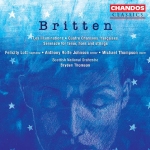 For
a soprano version of les Illuminations which really grips,
you need to turn to the Chandos reissue; not only does
Felicity Lott bring the music alive for me, the price is right,
too, with mp3 for £4.99 and lossless at £7.99. Though
the latter is 16/44.1 only, this version remains competitive
sound-wise, even heard straight after the new Channel Classics.
On the latter you’ll need to turn the volume up a notch
or two to enjoy the full effect of the wide dynamic range of
the very good recording – I listened to the 24/96 version. With
a more recent Chandos recording featuring Susan Gritton ruled
out for John Quinn and me by some vocal idiosyncrasies, this
is the soprano version to have, especially as Anthony Rolfe
Johnson’s and Michael Thompson’s contributions in the Serenade
were described at the time of their first release in 1989 as
‘one of the best imaginable performances’. I see no
reason to demur.
For
a soprano version of les Illuminations which really grips,
you need to turn to the Chandos reissue; not only does
Felicity Lott bring the music alive for me, the price is right,
too, with mp3 for £4.99 and lossless at £7.99. Though
the latter is 16/44.1 only, this version remains competitive
sound-wise, even heard straight after the new Channel Classics.
On the latter you’ll need to turn the volume up a notch
or two to enjoy the full effect of the wide dynamic range of
the very good recording – I listened to the 24/96 version. With
a more recent Chandos recording featuring Susan Gritton ruled
out for John Quinn and me by some vocal idiosyncrasies, this
is the soprano version to have, especially as Anthony Rolfe
Johnson’s and Michael Thompson’s contributions in the Serenade
were described at the time of their first release in 1989 as
‘one of the best imaginable performances’. I see no
reason to demur.
James Gilchrist, on the other hand, an accomplished singer of
Britten’s music, redeems the new Channel Classics album; his
recording of On this Island helped me to appreciate music that
had hitherto eluded me (Linn CKD404, with The Holy Sonnets
of John Donne, Seven Sonnets of Michelangelo and Canticle I
– see Download
News 2013/2) and his contribution in the Serenade comes
alive in a way that Hannigan’s Illuminations don’t, thus
making this new recording a mixed blessing.
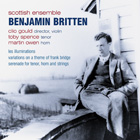 The
Linn recording offers all but one short item* of those
on the new Channel Classics but with a tenor soloist throughout.
Britten composed les Illuminations with a soprano in
mind, but it’s become a tenor work almost exclusively over the
years and Toby Spence on Linn is a worthy successor in the line
that descends from Peter Pears (Decca and Eloquence) via Ian
Bostridge (EMI). Bostridge is the man to beat in my book – I’m
not a great fan of Pears – and the light-toned Spence comes
very close to that, here and in the Serenade; both Bostridge
and Spence achieve the necessary power as effectively as Felicity
Lott and the recording, though 16/44.1, like the Chandos, comes
very close to matching even the 24/96 Channel Classics.
The
Linn recording offers all but one short item* of those
on the new Channel Classics but with a tenor soloist throughout.
Britten composed les Illuminations with a soprano in
mind, but it’s become a tenor work almost exclusively over the
years and Toby Spence on Linn is a worthy successor in the line
that descends from Peter Pears (Decca and Eloquence) via Ian
Bostridge (EMI). Bostridge is the man to beat in my book – I’m
not a great fan of Pears – and the light-toned Spence comes
very close to that, here and in the Serenade; both Bostridge
and Spence achieve the necessary power as effectively as Felicity
Lott and the recording, though 16/44.1, like the Chandos, comes
very close to matching even the 24/96 Channel Classics.
* I was under the impression that
Britten didn’t wish Now sleeps the crimson petal to be
performed alongside the Serenade, but I see that BIS
do so, too, on their recording with Christoph Prégardien
and Osmo Vänskä (BIS-CD-540).
If competition is fierce in les Illuminations,
it’s even fiercer in the Bridge Variations. Here, too,
the Linn recording offers a powerful performance, worthy to
be ranked with the best. If the Linn coupling appeals, there’s
every reason to go for it; Peter Lawson and I are not the only
reviewers to think highly of it. The new Channel Classics version
packs slightly less of a punch but that certainly doesn’t put
the new recording out of the running if the coupling appeals
and if, despite my reservations, you’re looking for a soprano
version of les Illuminations.
The only really naughty thing about the Chandos recording is
the claim on their web page ‘originally recorded in 2003’,
which is out by 15 years and really ought to be corrected.
Buxton ORR (1924-1997) Chamber
Music for Strings
String Quartet No.1, Refrains IV (1977) [23:01]
Duo for Baroque Violin and String Bass (1994) [8:20]
String Trio (1996) [14:45]
String Quartet No.2 (1985) [21:39]
Beethoven String Trio of London (Pavlo Beznosiuk (violin); Jeremy
Williams (viola); Richard Tunnicliffe (cello)) with Andrew Roberts
(violin); Maya Homburger (baroque violin); Barry Guy (double
bass) – rec. 2000 and 2001. DDD.
First recordings
Pdf booklet available
TOCCATA CLASSICS TOCC0103 [68:12] – from theclassicalshop.net
(mp3 and lossless)
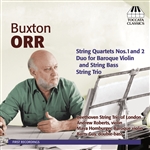 I’m
not the greatest lover of late 20th-century music but this recording
makes me wonder why we haven’t heard more – much more – of the
music of Buxton Orr. Perhaps it’s too approachable for the avant-garde
crowd? I see that these performances have been ‘in the
can’ for over a decade before seeing the light of day.
Whatever the reason, this recording makes we want to hear more
of Orr’s music; it’s not ‘easy’ but it pays dividends.
My next stop will be the Marco Polo recording of his Piano Trios
(York Piano Trio, 8.223842), available in mp3 and lossless
from eclassical.com
or stream from Naxos Music Library.
I’m
not the greatest lover of late 20th-century music but this recording
makes me wonder why we haven’t heard more – much more – of the
music of Buxton Orr. Perhaps it’s too approachable for the avant-garde
crowd? I see that these performances have been ‘in the
can’ for over a decade before seeing the light of day.
Whatever the reason, this recording makes we want to hear more
of Orr’s music; it’s not ‘easy’ but it pays dividends.
My next stop will be the Marco Polo recording of his Piano Trios
(York Piano Trio, 8.223842), available in mp3 and lossless
from eclassical.com
or stream from Naxos Music Library.
The performances are thoroughly sympathetic and the recording
is good: mp3 only from the Toccata Classics website, mp3 and
lossless from theclassicalshop.net; both offer the very useful
booklet of notes. I’m told that Toccata will be offering lossless
downloads soon.
Sir Peter MAXWELL DAVIES (b.
1934)
Piano Concerto (1997)* [36:02]
Worldes Blis (1966-69) [42:23]
Kathryn Stott (Piano)*
Royal Philharmonic Orchestra/Peter Maxwell Davies – rec. 1993
and 1997
Pdf booklet with text and translation of Worldes blis included.
NAXOS 8.572357 [78:25] – from classicsonline.com
(mp3 and lossless) or stream from Naxos Music Library
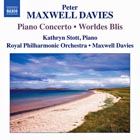 These
recordings were previously released, differently coupled, on
the defunct Collins Classics label, one of a whole run of Maxwell
Davies recordings there, in 1993 and 1998. I never got round
to buying any of that series, apart from a sampler on their
budget label, and by then the label had gone. Naxos have already
reissued Symphonies 1-3 with couplings, the string quartets
(separately and in a 5-CD box – review),
Linguæ Ignis and Vesallii Icones, and they
released Symphonies 4 and 5 – review
– at much the same time as the Piano Concerto and Worldes
Blis.
These
recordings were previously released, differently coupled, on
the defunct Collins Classics label, one of a whole run of Maxwell
Davies recordings there, in 1993 and 1998. I never got round
to buying any of that series, apart from a sampler on their
budget label, and by then the label had gone. Naxos have already
reissued Symphonies 1-3 with couplings, the string quartets
(separately and in a 5-CD box – review),
Linguæ Ignis and Vesallii Icones, and they
released Symphonies 4 and 5 – review
– at much the same time as the Piano Concerto and Worldes
Blis.
These are not only authoritative recordings; they are, to the
best of my knowledge, the only ones available, so they’re
essential for fans. Though I must admit that only a small amount
of Max’s music has yet clicked with me, these recordings have
gone some way towards achieving that end, especially as the
poem which inspired Worldes Blis, written out with musical
accompaniment in a medieval manuscript in the Bodleian Library,
MS Bodley 30, is one of the major Middle English lyrics: facsimile
here.
Grant FOSTER (b.1945)
Suite, The Pearl of Dubai: The Winter Palace: 1916-1918
[16:49]; Romance: Nicholas and Alexandra [11:04]; Dubai [3:45];
Fantasy: Anastasia [24:46]
The Ballad of Reading Gaol * [10:32]
Andrew Goodwin (tenor); Mira Yevtich (piano); Sergey Roldugin
(cello)*
Novaya Rossia Symphony Orchestra; Hermitage Symphony Orchestra;
Belorussia Symphony Orchestra/Zaurbeck Gugkaev – rec. 2011 and
2012. DDD.
Pdf booklet included
QUARTZ QTZ2091 [66:56] – from classicsonline.com
(mp3) or stream from Naxos Music Library
[‘This is certainly not music that breaks any boundaries
but it does show that it is possible to work within those boundaries
to produce results that are worth hearing.’ See review
by John Sheppard.]
 As
I was completing this Download News I was reminded in the nicest
possible way that it’s some time since I included any Quartz
recordings. Though it was a bit late to download and write about
anything new, I remembered listening to this programme of music
by Grant Foster, having been intrigued by John Sheppard’s review.
I made a mental note at the time to write about it – and then
inexcusably forgot. There may not be anything deep and deedy
here, but it’s all immensely approachable and extremely enjoyable.
If I compare it with good film music – Maurice Jarre, perhaps,
or the Warsaw Concerto – or the sort of music that Mantovani
used to perform with his shimmering strings, or Friday Night
is Music Night on BBC Radio 2, I don’t mean that to sound
at all pejorative.
As
I was completing this Download News I was reminded in the nicest
possible way that it’s some time since I included any Quartz
recordings. Though it was a bit late to download and write about
anything new, I remembered listening to this programme of music
by Grant Foster, having been intrigued by John Sheppard’s review.
I made a mental note at the time to write about it – and then
inexcusably forgot. There may not be anything deep and deedy
here, but it’s all immensely approachable and extremely enjoyable.
If I compare it with good film music – Maurice Jarre, perhaps,
or the Warsaw Concerto – or the sort of music that Mantovani
used to perform with his shimmering strings, or Friday Night
is Music Night on BBC Radio 2, I don’t mean that to sound
at all pejorative.
The Ballad of Reading Gaol, as befits the text, is much
more subdued. The performances, plush for The Pearl of Dubai,
and recording match the music – the latter sounds good in ‘best
quality’ from the Naxos Music Library, which augurs well
for the classicsonline.com download. You won’t, however get
the bonus DVD – for that you need to pay a little more for the
physical product.
Hafliði HALLGRÍMSSON (b.1941)
Choral works
Rúra, rúra barni (Sleep, my child, 2010)
[4:07]
Myrtuskógur (1993) [9:31]
Níunda Stund (Ninth Hour, 1993/2006): Engill
(Angel) [2:31]; Níunda Stund [3:46]; Nótt
(Night) [3:59]
Endurkoma (Last Coming, 2012) [4:24]
Sónhenda LXXVIII (Michelangelo Sonnet LXXVIII,
2010) [4:06]
Your Image (1986/2010) [10:15]
Lofið Guð i hans helgidómi (Praise God
in His Holiness, 1996/2012) [9:17]
Schola Cantorum Reykjavík/Hörður Áskelsson
Björn Steinar Sólbergsson (organ)
Elísabet Waage (harp)
Ásgeir H. Steingrímsson (trumpet)
Steef van Oosterhout (percussion) – rec. February 2008 and March
2012. DDD.
All premiere recordings.
Pdf booklet with texts and translations included
RESONUS RES10117 [52:05] – from resonusclassics.com
(mp3 and lossless)
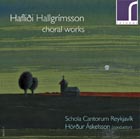 The
music of contemporary composer Hafliði Hallgrímsson,
an Icelander living in Edinburgh, has already appeared on an
earlier Resonus release of Christmas music – Download
News 2012/21. I wrote then that his music is clearly modern
but within an established tradition and that’s true of the present
recording. Indeed, though I understand that the opening lullaby
doesn’t refer specifically to the Nativity, it might easily
have been included on that earlier Christmas album.
The
music of contemporary composer Hafliði Hallgrímsson,
an Icelander living in Edinburgh, has already appeared on an
earlier Resonus release of Christmas music – Download
News 2012/21. I wrote then that his music is clearly modern
but within an established tradition and that’s true of the present
recording. Indeed, though I understand that the opening lullaby
doesn’t refer specifically to the Nativity, it might easily
have been included on that earlier Christmas album.
We have had recordings of his orchestral music, such as the
Ondine recording of his Cello Concerto – review
and review
– and of his religious work Passia (Ondine again) but
the shorter choral works here are very welcome. The booklet
informs us that Hallgrímsson is not a particularly religious
man but Endurkoma refers to a Last Judgment in which,
perhaps, no-one will be judged – a vision of the Second Coming
very different from that of the composer’s own Icelandic predecessor
who wrote in the Völuspá, a conflation of
pagan and Christian concepts, of the terrible time after the
fall of the Gods (Ragna rök or Götterdämmerung):
Skelfr Yggdrasils
askr standandi,
ymr it aldna tré,
en jötunn losnar;
hræðask allir
á helvegum,
áðr Surtar þann
sefi of gleypir.
(Yggdrasil, the world-ash-tree, shudders where
it stands; its old trunk groans and the giant is loosed; all
are terrified on the ways to hell before Surtar’s kin (fire)
swallows [them] up.)
By contrast, Hallgrímsson’s brief vision of the end is
peaceful, like most of his music here.
The performances are authoritative, the booklet of notes and
texts informative – though it’s silent on the meaning of Myrtuskógur
and it’s not an Icelandic word that’s within my limited and
largely forgotten grasp of Old Norse – and the recording excellent,
at least in 24/96 format. Another outstanding download-only
release from Resonus.
New Year’s Day Concert 2013
Josef STRAUSS Die Soubrette,
Polka schnell, Op.109 [2:42]
Johann STRAUSS II Kuss-Walzer,
Op.400 [6:01]
Josef STRAUSS Theater-Quadrille,
Op.213 [5:02]
Johann STRAUSS II Aus
den Bergen, Walzer, Op.292 [12:58]
Franz von SUPPÉ Leichte
Kavallerie, Ouvertüre [7:06]
Josef STRAUSS Sphären-Klänge,
Walzer, Op.235 [10:02]
Josef STRAUSS Die Spinnerin,
Polka francaise, Op.192 [3:42]
Richard WAGNER Lohengrin,
Prelude to Act III [3:22]
Joseph HELLMESBERGER
Jr. Unter vier Augen (In confidence),
Polka Mazur, Op.15 [4:25]
Josef STRAUSS Hesperusbahnen,
Walzer, Op.279 [9:06]
Josef STRAUSS Galoppin,
Polka schnell, Op.237 [2:15]
Joseph LANNER Steyrische
Tänze, Op.165 [7:03]
Josef STRAUSS Melodien-Quadrille,
Op.112 [4:24]
Giuseppe VERDI Don Carlo,
Prestissimo, Ballet music from Act III [3:17]
Johann STRAUSS II
Wo die Citronen blüh’n, Walzer, Op.364 [9:59]
Johann STRAUSS I Erinnerung
an Ernst oder Der Carneval in Venedig, Fantasie, Op.126
[7:13]
Josef STRAUSS Plappermäulchen,
Polka schnell, Op.245 [3:14]
New Year's Greeting [0:35]
Johann STRAUSS II
An der schönen blauen Donau, Walzer, Op.314 [9:44]
Johann STRAUSS I Radetzky-Marsch,
Op.228 [3:36]
Vienna Philharmonic Orchestra/Franz Welser-Möst – rec.
live, 1 January 2013. DDD.
SONY CLASSICAL 88765411632 [2 CDs: 1:55:53] – from amazon.co.uk
(mp3)
 Many
will have heard and/or seen this on New Year’s Day and won’t
need me to remind them that Franz Welser-Möst repeated
his triumph of 2011. I know that the VPO could play all this
music in their sleep, but it helps to have an Austrian conducting;
it’s no accident that Karajan’s 1987 concert and a collection
of Boskovsky recordings remain available when other New Year
offerings have fallen by the way.
Many
will have heard and/or seen this on New Year’s Day and won’t
need me to remind them that Franz Welser-Möst repeated
his triumph of 2011. I know that the VPO could play all this
music in their sleep, but it helps to have an Austrian conducting;
it’s no accident that Karajan’s 1987 concert and a collection
of Boskovsky recordings remain available when other New Year
offerings have fallen by the way.
One big plus for this year’s concert in my book was the inclusion
of more music by Josef Strauss even than his big brother Johann
II. Sphärenklange (Music of the Spheres) and Plappermäulchen
(blabber-mouth or chatterbox) are deservedly quite well known
but Josef’s last composition, Hesperusbahnen, first performed
shortly before his death at the Hesperus Artists’ Association
ball, much less so. I believe the only other available recording
is that on the Marco Polo Josef Strauss edition, Volume 7 (8.223567)
and also on the Naxos highlights CD from that series, The
Best of Josef Strauss (8.556846).
Unless you must have the DVD or blu-ray, this will do very nicely.




 All Nimbus reviews
All Nimbus reviews








